#i have found this is actually on a private server and not particularly reflective of real gameplay
Explore tagged Tumblr posts
Text
Marcille instant death blast GO
#arknights#marcille arknights#marcille#this says absolutely nothing about how good she actually is in IS or otherwise since IS5 is just absurdly fucking broken but like#it is extremely funny of her that she can do this#is5#integrated strategies#cn spoilers#so edit:#i have found this is actually on a private server and not particularly reflective of real gameplay#not even is5 gameplay#unfortunate
96 notes
·
View notes
Text
I have thoughts about q!Bad taking the soul vulture outside earlier because that really surprised me
He was sitting, depressed on the church roof talking about missing his kids in full view with it leashed by his side. Just numbly monologuing and barely acknowledging it was there as it continually kept on attacking him. He made no moves to stop what was happening, then just put it back in the box.
First of all. why????????
Like I can see no world where this was a rational decision???? Dapper kept these creatures under extremely tight security underground for a reason, because if the Federation/Code found out what they were capable of it could spell the end for everyone. In their journal, Dapper wrote about a time when one did accidentally escape outside, and she panicked and ran all over the server trying to contain it… now we have Sadboyhalo here choosing to take one out in public, attached to himself. Any islander could’ve walked by at any moment and saw him, put two and two together that this is the thing that’s been hurting him, the Federation could’ve seen it. this might literally be something that Dapper may consider a leak/betrayal too?
Maybe, q!Bad took it out to feel closer to his son on their birthday in some kind of twisted way, because it was the last thing they shared together? But then he easily could’ve gone to the actual secret soul vulture lab, right next to the sign she left and not take it outside??????? was it simply more self destructive behavior in a particularly bad moment? then why have it so risky in the open? idk guys it doesn’t make sense….maybe it’s not supposed to.
We’ve had the thought that he’s been using the soul vultures to continue Dapper’s research on the soul hearts / soul potions. Yeah I do think that he might be, but do I think that’s all? No. It has gone way too far for it to be just that anymore. I’ve been wondering this for a long time but today kinda proves it for me, I’m 100% sure that the soul vultures are playing as a symbolism for q!Bad’s mental state at the same time as causing a physical plot effect on the character. it’s the self-destructive behavior, the drastic actions he is willing to take, his pov of being expendable
At first, they reflected his torn up grieving mind and he’d go down to the cage on purpose to hurt himself. The damage started to leave lasting impact on his body with the blue corruption that’s gotten worse and worse, along with his mental health. Then he released a vulture in the cage to torture Ron, showing how far he was willing to go in crossing the line. Now, post-psychotic breakdown he brings the vulture out in public, which directly precedes what? him suddenly opening his house to the public for everyone on the server to come celebrate Dapper’s birthday party, where they got front row seats to the delusions he’d only been doing in private. it was so weird from him because this man never invites people to his house like that.
What is he intending by doing all of this? is he intending anything? how much is all part of his big plans, and how much is driven by emotion or a lack of lucid decision-making? maybe this new behavior is because he thinks his delusions can no longer be contained in “safe places” like his home anymore (because are they even safe?) and so he’s not caring to show it. or maybe he wants people to pay more attention as a cry for help?
I really have no idea but everything is soooo obviously getting worse with him. and his friends might be seeing more of this from here on out
#qsmp#qsmp badboyhalo#qsmp character analysis#this character makes me think so hard I swear steam is leaving my ears sometimes#tw self harm mention#text post
70 notes
·
View notes
Note
regarding your inexperienced w zines mod team- do u at least have somebody handling finances that has experience w a completed zine? that’s SUPER important, especially now, and I would urge you to reach out if not and find somebody to handle that positon. looking forward to this zine!
Hello anon,
I am Mod Dogfeathers*, and while posting directly to our socials is somewhat rare for me, I am This Simple Feeling's current Finance Mod, and so I thought it very important that I address your concerns directly, myself. I am very shy, I am neurodivergent, and I have severe social anxiety, and so most of the work I've done for This Simple Feeling thusfar has been infrastructural and supportive, somewhat away from wider visibility. However, I am extremely aware of the awesome responsibility that falls squarely on my shoulders as finance mod, and that the community around our zine– from my fellow mods and our potential contributors to the fans who will be cheering us on and reading issue 6 next year– must be able to depend on me to manage our finances through every stage of This Simple Feeling's production. The success of our project requires the community's collective confidence in me, and I am extremely keen to build that trust.
So, first, I want to apologize for the length of time that you've had to wait for this reply, and assure you we've been taking your concerns very seriously. Much of this time has been spent in deliberative reflection as to whether or not I should remain in this role. I love this project, and I have invested a prodigious amount of time and effort and affection into it since Head Mod @menecio approached me in early November 2020; I desperately want it to succeed. I have never wavered that I want to remain in this role, and my fellow staff have not wavered in their conviction that I should remain here, too. That said, I am aware that the success of our zine does not particularly care about what I want or what feels good, and so I took some time to seriously assess my own capabilities, to strenuously question my resolve, and to seek advice from people with zine experience who I trust. We have determined that I shall remain Finance Mod, but I want to stress that this was neither an easy nor an immediate decision– I did not let it be an easy or immediate decision, because what has always mattered to me is what's best for the zine. In the end, that determination was made based on the work that I've already done and the trust that my team has in my abilities.
Nevertheless, we want to emphasize that we continue to take your concerns seriously; we recognize that my lack of zine experience is both significant and reasonable cause for concern. We are taking additional measures to address that lack, beyond those that I insisted upon when I accepted this role. I will shortly lay out some of my relevant experience, but in recognition that it is limited and that it may not be sufficient to assuage your concerns, I want to make clear one of the additional measures that I requested during this period of consideration.
My husband and my partner of ten years, Tom, is a trained accountant, and he will now be supervising my work for this project directly. He had already agreed to assist me informally, and had– with supreme patience– already conducted a few intense, 6 hour long sessions to explain the ways that double-entry bookkeeping and Microsoft Access can be used to manage a project of this nature. He will continue to do that, but he will also be keeping an eye on my work and checking up that work periodically. I will still be managing our accounts, my name will still be on our books, and this will still be my job, but Tom will be actively present to confirm that I am doing this correctly. He does not have zine experience, he is not involved in fandom, and he does not have fandom-relevant socials– he has no specific pull towards fandom participation, the way I do– but he has worked for several years as one of two accountants for the library of one of the USA's top 40 public research universities, managing the extremely complex and surprisingly variable needs of such a massive nonprofit, and has been responsible for controlling several million dollars of public acquisitions spending in that capacity. (His way of describing this: "Each year we spent about the same amount as the budget for 10 Things I Hate About You, and I was in charge of a little over half of it.")
As part of this supervisory role, Tom is also going to maintain a presence in our server. He is not a mod and plays no part in decision making beyond occasionally giving us financial advice when asked, but he has appropriate server roles to provide direct access to mod discussions, so that he can be present to pay attention when I bring financial data to the team, and to answer our collective financial questions, should any arise that are beyond my personal capacity. When his schedule permits, he is also available to our contributors and mods to answer their questions directly in server.
What follows is a non-comprehensive, but hopefully thorough, summary of my relevant experience.
By training and professionally, I am a studio artist with an MFA, the terminal degree in my field. I manage my own studio practice. This is a complicated, variable job that requires a great deal of flexibility, responsiveness, and skill– most of which does not actually involve the hand-skills necessary to create the literal artwork the studio practice ostensibly produces. As an artist, I am a sole proprietor, and my studio is my business, but with very specific needs not necessarily found in other businesses, and I run it without assistants. I maintain my inventory and my supplies, I purchase and manage equipment necessary to create work, I manage my work through various states of creation and exhibition and– sometimes– publication, I take on clients for commission, I apply to shows (for which there is always a fee), I work with gallerists and curators, I research and make connections with different platforms and specialist logistics businesses (PayPal/money handlers, banks, streaming platforms, printers, data storage). All of those affect my studio's finances, and so they must be managed carefully, in addition to sales of prints and original artwork (thusfar handled privately, as is fairly normal– we are often encouraged not to maintain digital storefronts, because it can dissuade potential gallerists from representing us; I am in the process of threading that needle.) In this capacity, I have no employer: I am responsible for taxes– both knowing what they are and paying them– and fees, I am responsible for my costs, and I am responsible to my business partners. There is no external buffer– if I fail any of this, I am the only party responsible for making it right.
Because I believe in the transformative power of art (and, for that matter, fandom), I try to work with local arts organizations and nonprofits when possible, particularly when it comes to showing my work and engaging in community arts efforts. I prefer to support group projects that elevate multiple artists, and/or organizations that serve diverse communities. Prior to COVID, I was doing a volunteer-intensive residency with local community arts nonprofit whose mission is to bring art and heritage craft skills to communities that would not otherwise be able to access such training; COVID has necessitated a change in my ability to serve them, but I do still work for them in a more limited capacity, usually grantwriting.
Though I prioritize nonprofits, I have also worked as an assistant/intern for urban galleries using for-profit and co-op funding structures, which involved both basic work associated with gallery assistantship (manning desks, running errands, calling support businesses, promotion, show installation, etc), and sometimes work on specific projects that required knowledge of the institution's fiscal state and available funds (from contacting local businesses about the replacement of a gallery's floor and helping to plan the launching of a new residency, to more routine tasks, such as contacting local bakeries about catering or hosting satellite shows, and ordering promotional material from printers.) All galleries run on extremely tight budgets, and having been exposed to a variety different gallery funding structures (with concomitantly different priorities and audiences) gives me an awareness of the work and the precision required to achieve ambitious goals with extremely limited finances. They are why I price things out on three levels: the ideal, the nearly-ideal, and the most affordable that still meets our high bar for quality.
I have experience writing grants, both for myself and (more notably) for the nonprofit at which I am an AIR (artist in residence). The most ambitious of these grants has reached the second stage of consideration, which is notable both because the granting organization is not arts specific, the deciding board is composed mostly of bankers with deep fiscal expertise, and we were asking for funds significantly in excess of what that grant usually offers. That decision is expected in June of next year. Grant-writing is less of an abstraction on the skills necessary for a zine than it might initially seem: both involve my operation as an agent representing the organization for which I requesting money; art grants are usually for very specific projects with very specific constraints; they usually require that our funding comes from multiple sources that are then pooled to enact the project; the projects have a specific lifespan and a schedule on which key stages must be completed; they require extremely precise budgeting; we are directly accountable for both the project and the precise management and tracking of said funding; and we must be ready to provide statements and proof of the project's progress and funding at every stage of the project's active lifespan, as well as a summary report at the end.
I have curatorial experience with local and regional art shows, usually organized by a small independent team working closely with a local, preferably-nonprofit gallery who is lending us their space; those roles are very analogous to the XO/logistical role I am currently fulfilling for This Simple Feeling. Though we worked with local galleries, and could sometimes make use of some of their equipment (such as hammers and nails and– if we were very lucky– leftover paint), we were responsible for every aspect of the actual hosting of the show and associated costs. This included equipment rental, installation costs, costs to repair & repaint to walls from the normal damage of installation, catering, sometimes utilities and space rental, etc. All of those costs were additional to the cost of recruiting artists, hosting calls, managing the artists and their work, managing sales of the work throughout the duration of the show, managing the sales of any prints the artists or merch the artists wanted to offer alongside the work, and organizing any publications or promotional materials released for the shows. Each show had different financial needs, but they all required budgets prior to their beginning, modified when necessary as the project came closer to realization and new constraints presented themselves. The businesses we solicited quotes from and our cost-reduction strategies varied from show to show, but all of the teams I worked with were semi-formal groups of friends and collaborators, similar to the teams that design zines, and so we did not have a pool of institutional capital to use for funding– we had to generate or barter for all of that ourselves. We did it because we loved it and we believed in it, not because it was potentially lucrative (community art shows almost never are, even less than zines; the point is celebration of our community.)
And that, honestly, is one of the most relevant bits of experience I've accumulated to date, tangential but applicable to a project like this: the awareness that this kind of project is done for love, not money. Issue 6 is being produced for charity, but even wildly successful for-profit zines will almost never be able to make enough profit to adequately compensate the cost of the staff's time, which would be upwards of $20k, if you paid them $10/hr, which is below the cost of living in most parts of my country. The cost to hire freelance writers is, at minimum, $.10 a word. The artwork in zines would cost in the hundreds– and, more realistically, thousands– of dollars, in a professional illustrative or fine art context. The writers and artists who contribute to zines absolutely make work that reaches (and exceeds) the professional standards required to participate in those industries. Our contributors have trained for years to hone their skills, and they put those skills towards making work for us, for free; our staff similarly donate their time to accomplish very complex tasks to support that creative work; that time could be spent producing work for those professional contexts, but instead they give it to us, and they do that because they believe in us and our community, and they want to celebrate a fandom and a ship– Star Trek and K/S– that have brought us together, and (with Trek and K/S specifically) have supported fandom engagement for over five decades. They give that work to us, and the only thing they ask is for us to make a zine out of it. I am an artist and a writer, I have formal training in both disciplines, and I understand these costs: I cannot express how seriously I take the gift of their time and energy, and how profoundly I am humbled to be trusted with it.
If I sound zealous, it's because I am, and because I am excruciatingly aware that from the moment our staff begins working on this project and our contributors start making their works, the financial responsibility for taking all that gifted energy and skill and effort becomes solely my own. If I fail as finance mod, I do not fail only myself, as would be the case in my studio practice– I also fail my fellow mods and every single one of my contributors, and I fail the community responsible for the generation of work that has provided me solace for decades. If I fuck up as finance mod, it is solely my responsibility to make it right.
As I said before, your concerns are absolutely reasonable– I share many of them– and all of this experience is tangential, and zines are different projects to those that I've worked on before, with different constraints and needs. I have thus taken action and structured my own work as a mod to assuage these concerns in myself, in ways that I hope will concomitantly assuage some of your concerns as well. I am paying attention to my own inexperience, I am preventing myself from functioning on auto-pilot, I am taking nothing for granted, and I am being actively vigilant for the inevitable gaps in my own expertise.
That's easy to say, but what does it look like? Thusfar, it takes the form of huge amounts of research, and the connection to a extant network of experienced zinesters, both of which are repositories of information with which I am trying to plug some of my gaps. I know well, as an academic who also practices disciplines (art and writing) that are precarious by their nature, that there is a big difference between external research and experience– but if everyone starts somewhere, then I have gone to great lengths to map out the place where I'm starting as thoroughly as possible. I have read (and often annotated) literally every resource on the production and staffing of fandom zines that I could find. When I have a question, I check these sources and I also look for examples of whatever I'm curious about 'in the wild'. To determine the likely price of our zine, for example, I looked through seven pages of tags on popular hub/promotion blogs on Tumblr, and generated a comprehensive Excel sheet from one such session that allowed me to compare prices against the number of pages and the kinds of merch offered alongside the zines in question. To balance the holes in that mode of data collection, I have also sought contacts and tried to build a relationship with communities around zine production: i have close friends who work on zines (and who initially got me interested in this kind of project– you know who you are, and my thanks is infinite for your patience and your willingness to act as resource), and I regularly make a pest of myself by asking strange questions to folks in Discord servers dedicated to the topic (I am also grateful to these communities, in similar terms). When possible, or if the question is specific enough, I try to go directly to the source: when I was uncertain what, specifically, could be used to verify a PayPal account, and found conflicting answers in their documentation, I spent three days talking to various help desk personnel until I found a solid answer on which to proceed. All of this is basic, and deserves no accolades.
If I am anything in my personal art practice, it is a colorist, and so I already had fairly deep knowledge of color theory prior to my involvement here– however, because color accuracy is so important to printed artwork, and depends so much on printer technology, the capacity and setup of individual print shops, and digital color spaces, I have spent time researching this too. I have requested printing samples from 7 different printers, and I have peppered the ones that meet the zine's standards with esoteric questions about what kind of printing presses they use and what ICC profiles their digital presses are set up to handle. I have done this because when it comes time (very shortly) for our Art Mod (@i-drive-a-nii-san) and myself to make some final determinations on which printers we want to use, it is important to me personally that we have the most comprehensive data available with which to make that decision. The zine that we publish needs to be pragmatically affordable– but within the scope of that pragmatism, I want the best quality possible, so as to do justice to the contributions that will live on its pages.
I am aware that all of my experience is tangential, and that the direct relevance that it has on this situation is limited. I am aware that there are gaps in my knowledge. I am aware of the awesome responsibilities I have as finance mod, and that I am a potential bottleneck upon which this project either breaks and fails or through which it passes and succeeds. I am aware of the gift inherent in every work we receive and every moment of staff working time, and the legacies at play with K/S specifically. I am aware that all the book-learning in the world has limited bearing on the actual experience of doing something on the ground. I find my experience lacking, and for that reason, I very seriously considered stepping down. I am humbled by the responsibility required by this position; I decided to stay because the trust my team expressed in me was also humbling.
My experience may be tangential, but there is a final element that I strongly suspect is applicable to my role as finance mod (and mod generally): in a project like a zine, done for love and for community, there are a myriad ways in which trust matters, small enough to overlook but overwhelming in their accumulation. The trust of the external fandom/zinester community matters, and for that reason I am being as honest as possible, and almost ceded my position to someone with greater experience; the trust of one's fellow staff and collaborators also matters in significant ways. An administrative team that trusts each other– that has confidence in each others' abilities and convictions, that understands each others' outlooks and that communicates well, and that deeply believes that that they will mutually have each other's backs– that kind of administrative team is an awesome thing, and their confidence is often perceptible to the contributors in very real ways, who then trust the administrative team to have their backs and to support them as necessary. Collaborators and administrators who have established that trust with each other tend to work together more effectively, and produce stronger work as a result, especially in a creative capacity. Good work requires creative risk-taking, which in turn requires the certainty that administration can support the necessary risk-taking and facilitate its success. The establishment of such trust is not automatic– we must work for it, actively– but the team involved in issue 6 of This Simple Feeling has that trust in each other, and the willingness to build it with both our collaborators and the wider community around our zine.
My confidence in the rest of my team is unshakeable. They have, in turn, expressed their confidence in me, that I am able to do the tasks and handle the responsibility involved with being finance mod on a project as specific and complex as a fandom zine for charity; I will trust them, and I will continue to work to earn their trust. I will also trust the broad community of zinesters around me, and solicit their expertise to help me navigate unfamiliar waters, and I will trust the professional expertise of my partner, who I have asked to donate his time. I will not lie, and so I make no promise that I won't fuck up in this role– but I will absolutely promise that if I do, I will make it right, and I will do everything in my power to prevent such fuckups from occurring in the first place.
I encourage you or anyone else to contact me if you have further questions; I can be reached through the contact forms on my personal Carrds– both linked on This Simple Feeling's staff bio on the Carrd– or alternatively you can request my Discord handle via DM on This Simple Feeling’s Tumblr or Twitter.
- Mod Dogfeathers/42/booleanWildcard/NAB
* I write fanfiction under the name booleanWildcard, and I am known socially as 42 or */asterisk. I post drawings as Dogmachine. I sign my visual work as NAB, my initials.
* We are using Microsoft Access instead of Excel, because Access is more flexible and comprehensive with its ability to cross-reference multiple fields. We will use it to generate reports for release, including possibly ones that can be plugged into Excel/Google Sheets
7 notes
·
View notes
Text
Important
Hey all. Just wanted to respond to questions from members of a couple of Discord servers run by the same person following a chaotic couple of days. I’m putting all the info and screenshots (minus names, pics and locations) here, so I can just direct people to this post if they have questions.
I had been intending to just head back here to Tumblr and let the situation lie, but unfortunately the reason given by the automated bot for my ban mentioned “crossing consent multiple times”. Today, friends have been sending me worried questions relating to this, so I’m concerned that the server owner may have made a similar claim in public. Now I pretty much have to say something as that’s such a serious thing to say about someone, particularly on any kind of kink scene.
The mention of consent actually relates to the server owner. Near the beginning of the lockdown, she and I were speaking a lot, she began to tease me in DMs, I responded with a piece of writing dedicated to her, we exchanged pictures - and eventually confessed a mutual attraction. We made plans for the end of lockdown, she talked about driving through Europe and showing me her favourite places. Although her English is perfect, I began learning her language through an app as I wanted to make the effort (Brits are renowned for being lazy with languages), and kept it up every day for months, amusing her with my clumsy pronunciation on calls. Sometimes she would send me explicit comments/thoughts, although I was always nervous to initiate that kind of thing.
One day she sent a message saying that she was still coming to terms with the end of her last relationship and would need to take things more slowly, as she was finding romantic sentiments (as opposed to kinky ones) hard to deal with. Naturally I replied “Of course, in that case I’ll wait for you to initiate that stuff once you’re ready”. At some point afterwards, she sent me a message out of the blue saying “I want cuddles ❤️” and I thought “oh, this is a level she’s OK with” and responded. I think it was the following day when I tried to pick up where we’d left off (without going any further, just cuddling in bed type stuff). She reciprocated and we continued. I also (in an attempt to consider her feelings) asked her if the idea of me posting an old session video on my blog for an American friend would upset her at all. Intending to reassure her about my intentions, I mentioned ”...not wanting to tickle anyone except you and saying no to all of the other UK people on the servers who are asking about post-lockdown sessions”. I also said “I do feel a commitment to you”, which (with hindsight) was probably a foolish or misleading word to use in a purely ler/lee sense.
A week later she sent a message I didn’t immediately understand along the lines of “I thought you were going to let me initiate romantic stuff, you don’t seem to have understood me at all”. I wasn’t sure what she was referring to - the recent story I’d written for her? Use of the word “commitment”? Something else? I tried to talk with her on the phone as some wires had clearly become crossed via text, but she refused for five weeks (citing not being in the right headspace), before finally calling when I sent a message explaining that anxiously waiting to mend the friendship in lockdown by myself for over a month was having a terrible effect on me mentally, and I was going to have to “throw in the towel”, wishing her luck and every happiness.
During our phone call, she claimed that the main issue had been the fluffy cuddle messages which she took to be a serious and repeated boundary/consent violation (citing her wish to avoid romantic talk). This was the last thing I expected and really shocked me. Of course I apologised frantically, repeatedly and profusely. I also said I hoped she could see how I’d made the mistake innocently and honestly when:
- she initiated it the first time, so I assumed it was something she was happy to talk about.
- when I picked up where we left off, she didn’t say “Actually, d’you mind if we don’t today?” and continued the cuddle talk instead.
She said that because she initiated it one day didn’t mean that she wanted to continue the day after - fair enough. The difficult thing to accept was the idea that she felt so violated by the attempt to carry on the next day that she found herself frozen to the point of not being able to say “actually I’m not in the mood just now” and carried on with it, and that I was at fault regardless. She even used the word “harassing” to describe it, which I found very harsh considering my inability to read minds over hundreds of miles. Especially when I couldn’t see or hear her to pick up on body language, tone of voice etc to guess that she was saying one thing but feeling a different way. She said, word for word, “It’s like when someone’s choking you and you can’t speak, you’re literally choking me!” As someone who, as a teenager, was once choked on the ground by my own father until I blacked out and lost bladder control, I did see that as a stretch at best, but chose not to challenge it as she was upset.
I also suggested that, looking back, we probably should’ve clarified exactly what was meant by “romantic stuff” when we almost certainly had different takes on it eg. I’ve cuddled after every 1:1 session I’ve ever had, even platonic ones, purely from the angle of aftercare and a sense of having shared an experience. I was told that despite our different ages and experiences of romantic love, there was only one objectively correct definition of “romantic” - hers.
We went around in circles for over four hours - I apologised over and over while explaining how I got the wrong idea and asking her to understand and forgive, while she tearfully called me a gaslighter, a consent violator, an excuse-maker, a harasser ... eventually I collapsed into tears myself (I’m ashamed to admit), totally worn down, and she softened a bit. She finally said she didn’t believe I’d done anything intentionally, and she still wanted to spend time together in the real world. We made up, spoke warmly as friends for an hour, and I left the call exhausted but relieved. After a few days’ reflection, though, I decided against ever travelling to meet her for real, as the experience had shaken me considerably - and I figured it’d be risky to meet someone in real life when I didn’t trust her completely not to accuse me over either nothing or an innocent misunderstanding. I was still wondering how to explain this to her when things got wild on the server.
A few days ago, a Tumblr user with a stated age of 18 contacted me to say nice things about my blog, which (I hope this doesn’t sound conceited) isn’t out of the ordinary. When she told me she was English and totally new to the scene, I suggested the Discord server as a place where she might make some friends (given the large UK membership) and sent her an invite link. The rest is set out in the mega screenshot saga below, which begins in the staff chat. I’m “SwiftX”, my real name is in teal, the server owner is in blue and her friend and co-moderator is in purple. All other names and locations are in black:

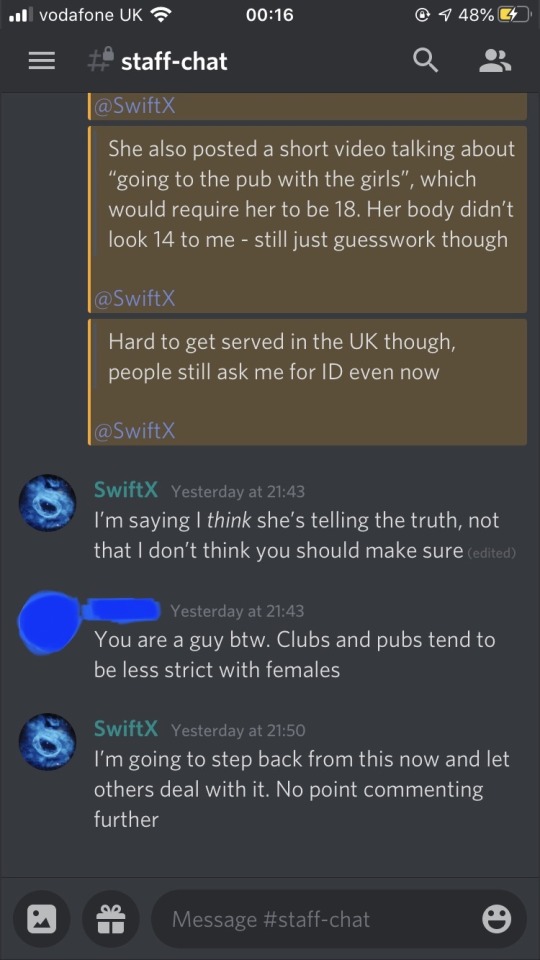
Before sending the last message, I actually typed out five different versions of a counter-argument before eventually deciding to step back. Being totally dismissed and lectured by two people about British labour laws and pub ID measures by two non-Brits nearly a decade my junior was irritating, yes, but the baseless suggestion that maybe I’d done something in private with the new member and was somehow “arguing against” ensuring she wasn’t a child because of that horrified me. As if I’d allow a child access to explicit content to cover my own discomfort - and anyway, I’d done no more than exchange greetings with the girl and point her towards the server, where she was actually verified and granted access to all channels by the guy in purple, not me! After a couple of hours’ contemplation, I politely asked to be removed from the moderator staff, but a disdainful response to my request prompted me to explain it, and why I was upset. Not all of what I said was necessary to say, but all of it was true:
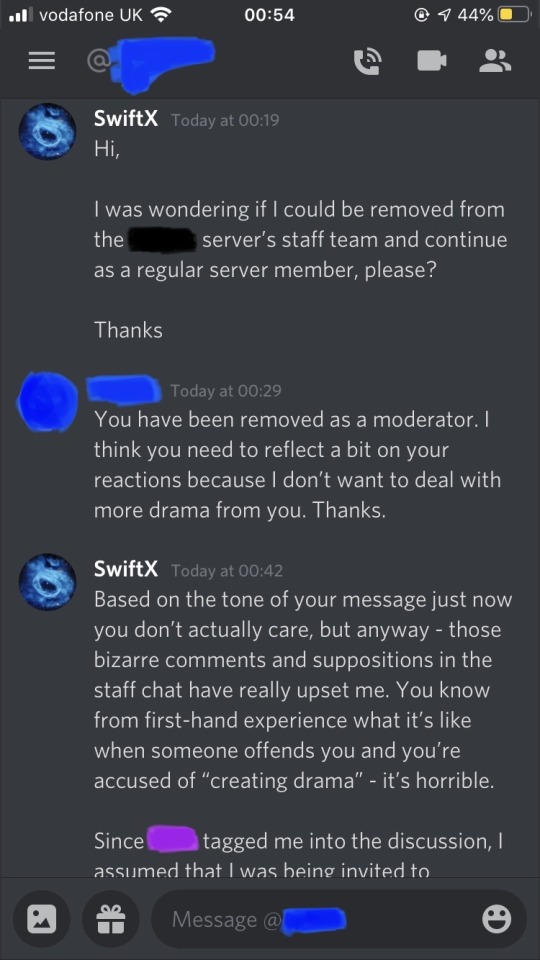
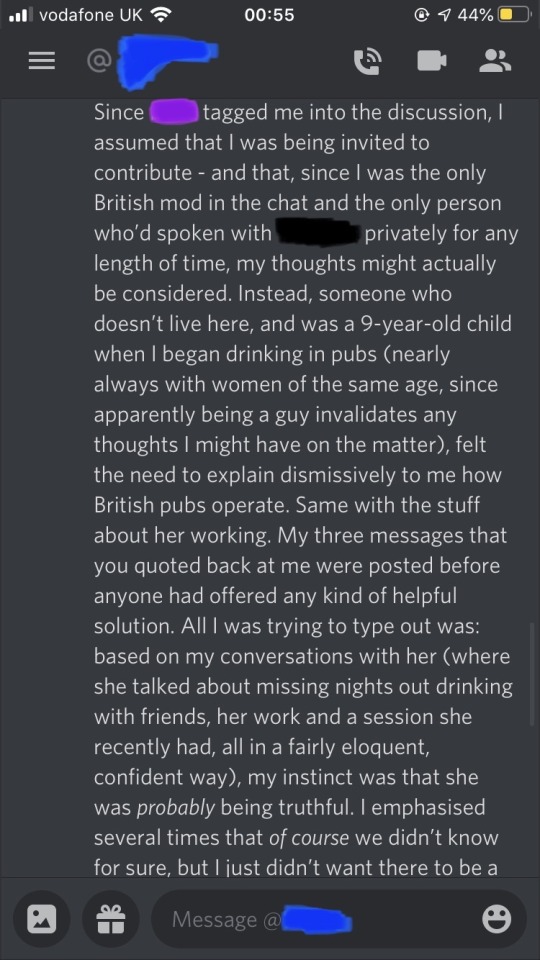
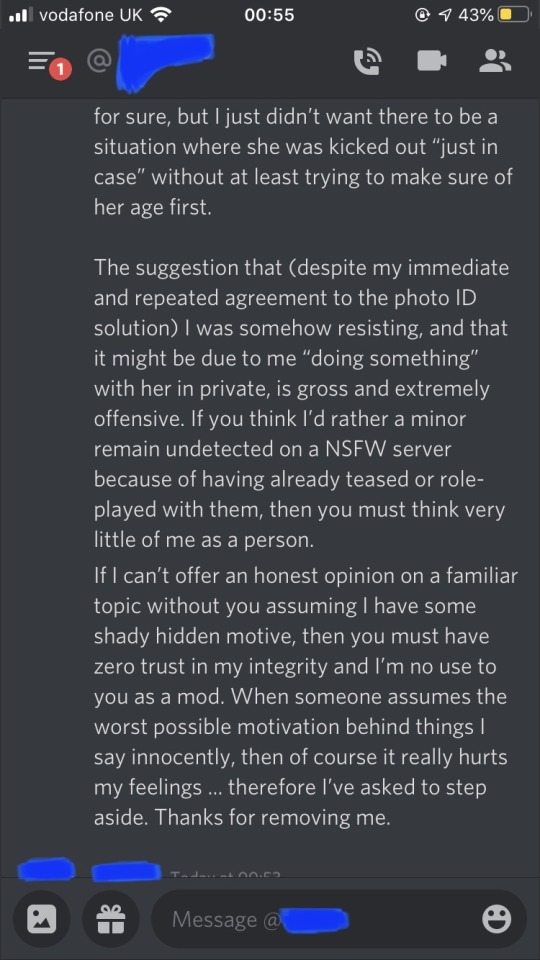
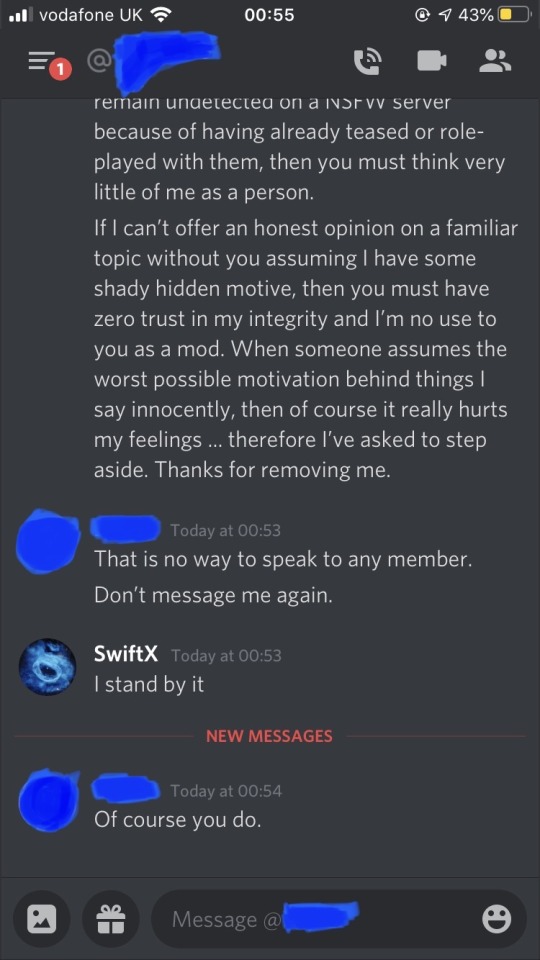
She immediately muted me for 48 hours - “staff disrespect and degrading comments”. Not a problem, I had work to be getting on with. Late that evening, however, her friend arrived in my DMs:
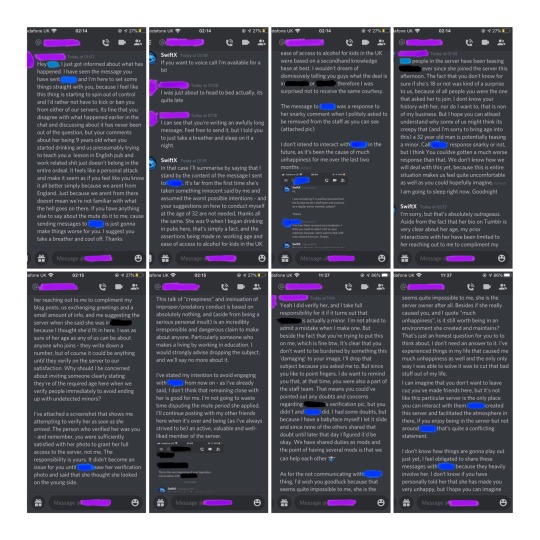
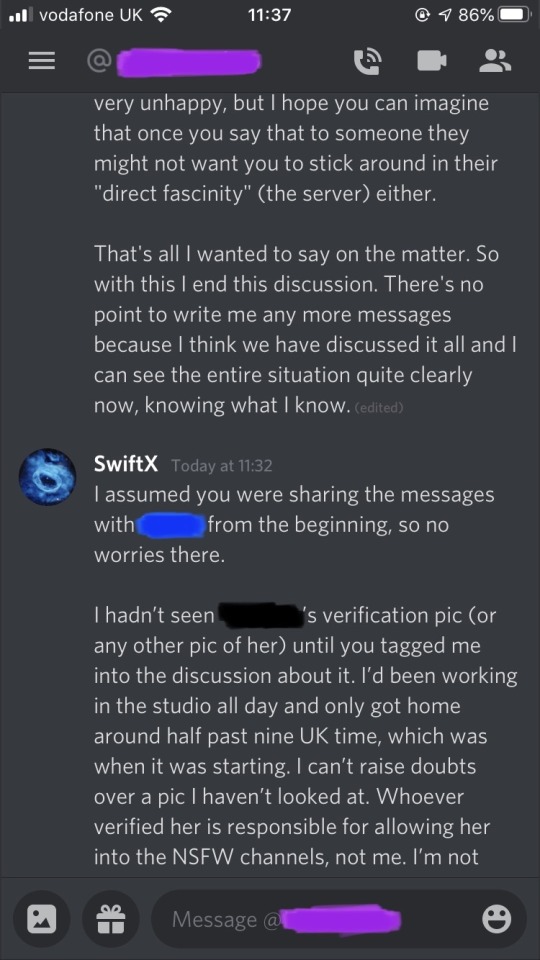
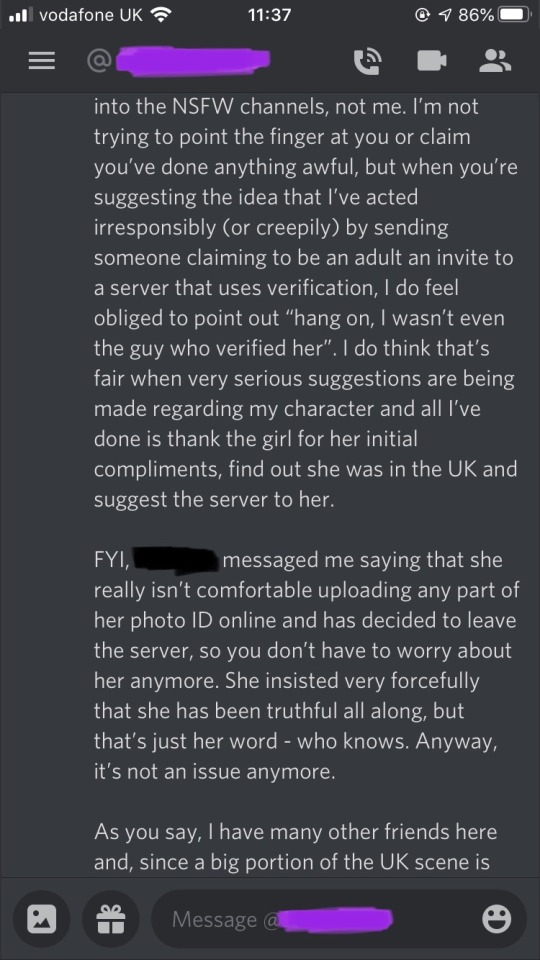
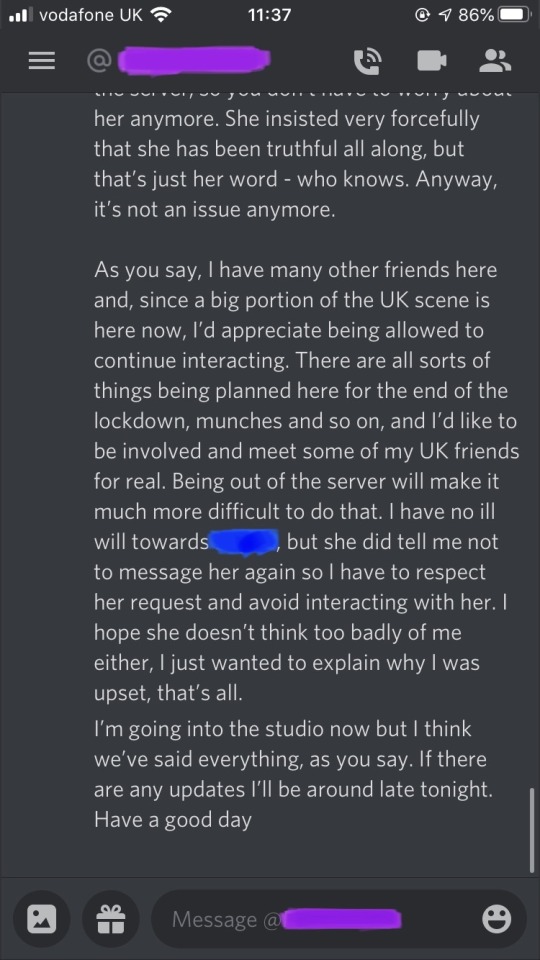
Him: ...it’s creepy that a 32 year old man is potentially teasing a minor
Me: Well I can prove I haven’t teased her, her profile says she’s 18, and the person who exposed her to explicit content was you when you verified her - despite admitting to having had doubts about her age.
Him: ...I’ll drop that subject
Moderator of the year, ladies and gentlemen 🙄 Anyhoo, later that day I received a ban notification from both servers run by this owner, citing “crossing consent multiple times, guilting and being degrading along with causing several conflicts”. I was surprised to feel a flood of relief, but the consent mention really disturbed and worried me, as I’d been under the impression that the server owner had fully accepted that the earlier stuff had been an innocent misunderstanding. Later that day, good friends of mine began sending me worried DMs questioning my record and asking if I’d been inappropriate with a bunch of people, so I’m concerned that the staff may have said something that (deliberately or not) has encouraged speculation. This post is intended to be a landing page to which I can direct anyone concerned about my character so that they they can form their own opinions.
When my follower count began to take off, I became determined to avoid any kind of rift with another prominent member of the community. It’s so frustrating to watch an already niche subculture splinter into factions over needless disputes. This is why I’ve kept names etc. out of this post. If anyone suspects they might know who the server owner is, or actually knows who she is because they’re here from Discord, I would implore them not to out or target her in any way. There are two reasons:
- I don’t want to start a flaming war, I’m desperate to move on and begin improving my mental health after an awful couple of months ... I just need to protect my reputation first.
- I don’t actually think she wanted drama ... I think her genuine perception is that I’ve said something horrible to her. That’s more upsetting than the idea of her trying to smear me, to be honest. I suspect she feels like crap too, and I don’t want to add to her mental load. I honestly hope she’s OK.
Hopefully this will reassure my friends and anyone else questioning my character because of whatever’s been said in that server. I’d also hope that my history of positive interaction here, including being on great terms with everyone I’ve ever had a session with, supports what I’m saying further. It’s a shame this had to happen, but I’m trying to think positively about what lies ahead and trust in my real friends. I’d also like to thank the other members of the server staff who’ve privately sent me messages of support and sympathy having already seen the entire exchange.
20 notes
·
View notes
Text
The Full Story of the Sand Tarakava
This is something that you see a lot of myths flying around about, so I wanted to write up something that could be pointed to as easy reference for the facts. You may have seen or heard of this guy:

Read on for the somewhat convoluted history behind him.
To start, here are some things that are NOT true, but frequently repeated:
There were five of these models given to private collectors directly by Lego
This is a cancelled set
The second point is easy to address: its just a prototype of the final Tarakava set that we did get. Color adjustments like this were never uncommon for the Bionicle design process. I don’t know where the five-model rumor originated, but we’ll debunk that as we get into the real story.
Flashback to the Fall and Winter of 2000. Bionicle is still months from launching (many months for everyone in North America), but work has begun on the tie-in media that will supplement the toyline. Of specific interest to us are the doomed PC game The Legend of Mata Nui (LOMN), and the web game we now know as the Mata Nui Online Game (MNOG). These games needed to integrate the Rahi as enemies, but as summer 2001 releases, the Rahi designs were still being finalized. So what do the developers of these two games (Saffire and Templar, respectively) receive from Lego? Prototypes! The particular Tarakava we see in the picture above was sent to Saffire for LOMN. And, indeed, take a peek at the Tarakava model in the game:

Image captured by PeabodySam
...and compare it, particularly the muzzle, to our prototype Tarakava:

That’s a match, baby!! And it’s significantly different from the final Tarakava design, which doesn’t even use a Ruru mask. Note also the use of the longer 45-degree beams to attach the jaw on the final model, as opposed to the smaller 90-degree parts on the prototype:
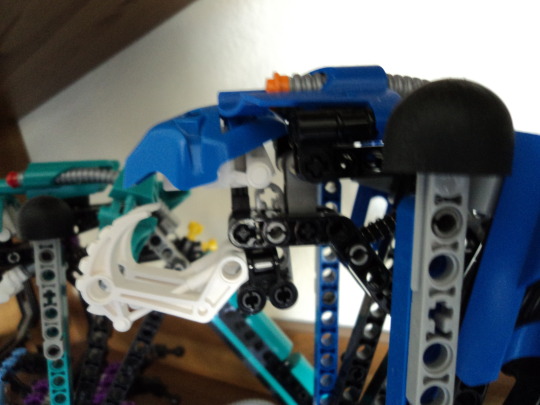
I didn’t make this observation myself - the shared Ruru was noted by JrMasterModelBuilder, then The Shadow Emperor realized that the LOMN model and the prototype were totally identical. So thanks to them both!!
So Saffire modelled their Tarakava on this prototype, then color-shifted it when they had access to more finalized designs. The same thing happened with Templar in MNOG:

This doesn’t mean, though, that Templar had their own copy of this Tarakava!! Saffire shared their 3D models with Templar, and many of MNOG’s early graphics are based directly on those models. Such appears to be the case here.
The plans for MNOG’s final minigame, where you fight all the Rahi at the Kini-Nui, were much more ambitious than the team ultimately had time to implement. While the completed version only incorporates the four relevant retail Rahi sets, there were several more beasts that had their stats figured out in anticipation of being included. We can see this in Templar’s retrospective blog entry on the chapter:

See that, fifth up from the bottom? Sand Tarakava. Someone at Templar must’ve been fond of the colors of the prototype model, and wanted to include it in the minigame! While time didn’t allow, the dialogue addressing this full bestiary was already written, and was included in the game. So we get this from Kopeke:

This, from November 2001, was actually the first time any fans would have heard of a ‘Sand Tarakava’ - nobody outside the teams working on Bionicle even knew about the prototype itself yet.
Meanwhile, at Saffire, our prototype friend had outlived its usefulness for game production. What happened next is here recounted by Darvell Hunt, who by some small miracle is the one developer on LOMN that has been receptive to communicating with the fan community.
We once had a group activity at the local bowling alley and the reward to the first person who got a strike was a prototype LEGO toy. I forget which one it was, but it was a yellow creature which punched, like a boxer, when you pressed on left and right levers at the back, and had triangular tracks for feet. I won the prototype toy that day and got to take it home.
About a year later, Hunt made the decision to part with his prize:
I had it for a couple years [sic], but unfortunately, I sold it on eBay a few years later [...]
Thanks to The Shadow Emperor for grabbing these quotes from the Litestone Discord server
Hunt later clarified that he actually believed he sold the Tarakava in 2002. So where did it go? Well, we can’t say with total certainty. But what we do know is that, also in 2002, Mark of Mask of Destiny acquired just such a model, debuting it to the public for the first time.
The Sand Tarakava in my possession is a prototype model, not a MOC. I did not build it. It will not be produced as a set, except in that the retail TARAKAVA were derived from it. I am not at liberty to discuss where or how I found the Sand Tarakava, other than to say it was through sheer luck while looking for a BIONICLE Mini-CD. No one from The LEGO Group sent it to me.
It sure sounds to me a lot like Mark lucked out and came upon Hunt’s eBay auction!
I guess either Mark or some other fans, upon seeing Mark’s pictures of the model (still the only images extant of the actual prototype!) put two and two together in a way that just so happened to be correct - this was the very fellow Templar had designated the Sand Tarakava.
The official Bionicle lexicon went up in 2002, and it appears the creators trawled MNOG for terms (see for example, the inclusion of ‘ensign’, ‘drifts’, and several very specific treespeak words). They picked up on Templar’s Sand Tarakava mention and included it with this definition, hewing close to what could be derived from the creature’s name.
A desert-dwelling breed of Tarakava.
From here, the Sand Tarakava came onto the radar of Greg Farshtey and Jeff James, who embellished this further for the Rahi Beasts book in 2005. They seem to have been aware of fan talk about the prototype as well, as they mention the creature is smaller than regular Tarakava - reflecting the prototype’s more hunched stature compared to the final models.

And that is the entire saga of this yellow lizard. A fairly bog-standard prototype that, through a very specific and weird set of circumstances, became an official creature in the Bionicle mythos, and the object of many collectors’ desires. Its funny how this stuff happens.

79 notes
·
View notes
Text
5 milestones that created the internet, 50 years after the first network message
by Scott Shackelford

This SDS Sigma 7 computer sent the first message over the predecessor of the internet in 1969. Andrew 'FastLizard4' Adams/Wikimedia Commons, CC BY-SA
Fifty years ago, a UCLA computer science professor and his student sent the first message over the predecessor to the internet, a network called ARPANET.

The log page showing the connection from UCLA to Stanford Research Institute on Oct. 29, 1969. Charles S. Kline/UCLA Kleinrock Center for Internet Studies/Wikimedia Commons
On Oct. 29, 1969, Leonard Kleinrock and Charley Kline sent Stanford University researcher Bill Duval a two-letter message: “lo.” The intended message, the full word “login,” was truncated by a computer crash.
Much more traffic than that travels through the internet these days, with billions of emails sent and searches conducted daily. As a scholar of how the internet is governed, I know that today’s vast communications web is a result of governments and regulators making choices that collectively built the internet as it is today.
Here are five key moments in this journey.
youtube
Leonard Kleinrock shows the original document logging the very first ARPANET computer communication.
1978: Encryption failure
Early internet pioneers, in some ways, were remarkably farsighted. In 1973, a group of high school students reportedly gained access to ARPANET, which was supposed to be a closed network managed by the Pentagon.
Computer scientists Vinton Cerf and Robert Kahn suggested building encryption into the internet’s core protocols, which would have made it far more difficult for hackers to compromise the system.
But the U.S. intelligence community objected, though officials didn’t publicly say why. The only reason their intervention is public is because Cerf hinted at it in a 1983 paper he co-authored.
As a result, basically all of today’s internet users have to handle complex passwords and multi-factor authentication systems to ensure secure communications. People with more advanced security needs often use virtual private networks or specialized privacy software like Tor to encrypt their online activity.
However, computers may not have had enough processing power to effectively encrypt internet communications. That could have slowed the network, making it less attractive to users – delaying, or even preventing, wider use by researchers and the public.

Vinton Cerf and Robert Kahn with President George W. Bush at the ceremony where Cerf and Kahn were given the Presidential Medal of Freedom for their contributions to developing the internet. Paul Morse/White House/Wikimedia Commons
1983: ‘The internet’ is born
For the internet to really be a global entity, all kinds of different computers needed to speak the same language to be able to communicate with each other – directly, if possible, rather than slowing things down by using translators.
Hundreds of scientists from various governments collaborated to devise what they called the Open Systems Interconnection standard. It was a complex method that critics considered inefficient and difficult to scale across existing networks.
Cerf and Kahn, however, proposed another way, called Transmission Control Protocol/Internet Protocol. TCP/IP worked more like the regular mail – wrapping up messages in packages and putting the address on the outside. All the computers on the network had to do was pass the message to its destination, where the receiving computer would figure out what to do with the information. It was free for anyone to copy and use on their own computers.
TCP/IP – given that it both worked and was free – enabled the rapid, global scaling of the internet. A variety of governments, including the United States, eventually came out in support of OSI but too late to make a difference. TCP/IP made the internet cheaper, more innovative and less tied to official government standards.
1996: Online speech regulated
By 1996, the internet boasted more than 73,000 servers, and 22% of surveyed Americans were going online. What they found there, though, worried some members of Congress and their constituents – particularly the rapidly growing amount of pornography.
In response, Congress passed the Communications Decency Act, which sought to regulate indecency and obscenity in cyberspace.
The Supreme Court struck down portions of the law on free-speech grounds the next year, but it left in place Section 230, which stated: “No provider or user of an interactive computer service shall be treated as the publisher or speaker of any information provided by another information content provider.”
Those 26 words, as various observers have noted, released internet service providers and web-hosting companies from legal responsibility for information their customers posted or shared online. This single sentence provided legal security that allowed the U.S. technology industry to flourish. That protection let companies feel comfortable creating a consumer-focused internet, filled with grassroots media outlets, bloggers, customer reviews and user-generated content.
Critics note that Section 230 also allows social media sites like Facebook and Twitter to operate largely without regulation.
1998: US government steps up
The TCP/IP addressing scheme required that every computer or device connected to the internet have its own unique address – which, for computational reasons, was a string of numbers like “192.168.2.201.”
But that’s hard for people to remember – it’s much easier to recall something like “indiana.edu.” There had to be a centralized record of which names went with which addresses, so people didn’t get confused, or end up visiting a site they didn’t intend to.

For years, Jon Postel held the reins to the internet’s address system. Jon Postel/Flickr
Originally, starting in the late 1960s, that record was kept on a floppy disk by a man named Jon Postel. By 1998, though, he and others were pointing out that such a significant amount of power shouldn’t be held by just one person. That year saw the U.S. Department of Commerce lay out a plan to transition control to a new private nonprofit organization, the Internet Corporation for Assigned Names and Numbers – better known as ICANN – that would manage internet addresses around the world.
For nearly 20 years, ICANN did that work under a contract from the Commerce Department, though objections over U.S. government control grew steadily. In 2016, the Commerce Department contract expired, and ICANN’s governance shifted to a board of representatives from more than 100 countries.
Other groups that manage key aspects of internet communications have different structures. The Internet Engineering Task Force, for instance, is a voluntary technical organization open to anyone. There are drawbacks to that approach, but it would have lessened both the reality and perception of U.S. control.

This 2007 photo shows an Iranian nuclear enrichment facility in Natanz, which was apparently the target of the first known cyberweapon to cause physical damage. AP Photo/Hasan Sarbakhshian
2010: War comes online
In June 2010, cybersecurity researchers revealed the discovery of a sophisticated cyber weapon called Stuxnet, which was designed specifically to target equipment used by Iran’s effort to develop nuclear weapons. It was among the first known digital attacks that actually caused physical damage.
Almost a decade later, it’s clear that Stuxnet opened the eyes of governments and other online groups to the possibility of wreaking significant havoc through the internet. These days, nations use cyberattacks with increasing regularity, attacking a range of military and even civilian targets.
There’s certainly cause for hope for online peace and community, but these decisions – along with many others – have shaped cyberspace and with it millions of people’s daily lives. Reflecting on those past choices can help inform upcoming decisions – such as how international law should apply to cyberattacks, or whether and how to regulate artificial intelligence.
Maybe 50 years from now, events in 2019 will be seen as another key turning point in the development of the internet.
About The Author:
Scott Shackelford is Associate Professor of Business Law and Ethics; Director, Ostrom Workshop Program on Cybersecurity and Internet Governance; Cybersecurity Program Chair at IU-Bloomington, Indiana University
This article is republished from our content partners over at The Conversation under a Creative Commons license.
4 notes
·
View notes
Text
Sception Plays Demon’s Souls, part 7 - Stonefang Tunnel
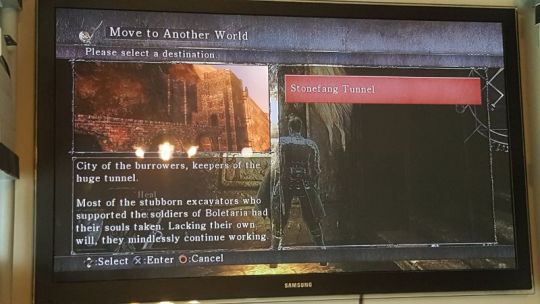
So last time I made it most of the way through 1-2 (starting to pick up the lingo here) - or at least I think I did, as I got to the end of the dragon bridge only to get killed by the bunch of archers & blue eye knight. I could see a fog door past them that I think is the boss room, but maybe not, the overall level to that point was a lot smaller than 1-1.
The stage wasn’t too hard. If that is the boss door, I’m pretty sure I could have just gone straight back right away and probably made it through, and I did leave a decent pile of souls over there... but not really *all that* many, and if I’m in soul form anyway I might as well check out those other archstones that opened up while there’s no major additional penalty for dying, right? So instead of returning to 1-2, I head over to 2-1 to give that a try.
But before I get into that, I did a bit of searching around online and found this -

https://thearchstones.com/index.html
Yeah, apparently some dedicated fans have a working private server up, so I can actually play Demon’s Souls with at least some of the original experience intact!
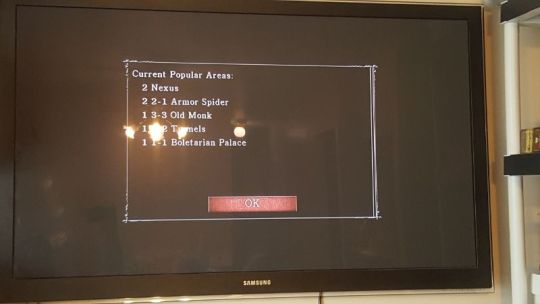
Granted, it’s not a particularly *busy* private server, so I may or may not run into any actual multiplayer, but at the very least there will be some messages & such.
Oh, and I’m sorry for the bright reflection of the lights. Somehow I didn’t notice them while playing this time around, so yeah, they’re going to be there for the next couple posts.
So, Stonefang Tunnel...
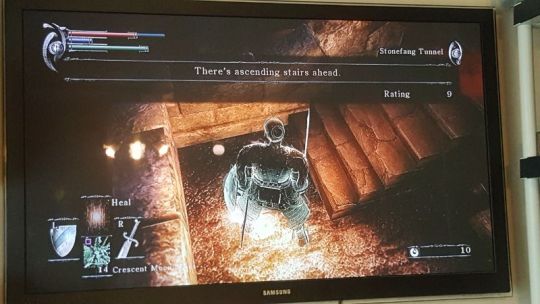
Messages already! Fun!

There’s a merchant right away who sells some upgrade stuff, but it’s expensive enough that I think just farming the phalanx enemies at the start of 1-2 would be faster.
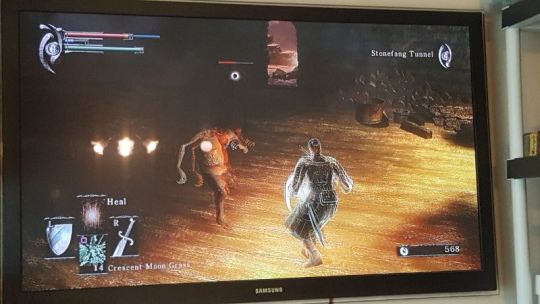
The main enemies are these super passive miner guys. They ignore you at first, but they *do* eventually aggro when you start fighting other enemies so I get surrounded pretty quickly after ignoring the first bunch. That and, while they’re slow and not at all hard, they take a long time to kill with my current weapons.
After dying once I head back to 1-2 and grind out upgrade mats until my halberd is up to +4, and level up a bit with the spare souls before coming back.

The level is pretty neat, actually, winding over itself a fair bit. In addition to the slow miners there’s also some fiery geckos that will drop down from the walls on you if you get close, and a couple of fat laughing pyromancer guys who are fun. Lots of levers and machinery, including shortcuts in the form of a lift that runs back to the beginning...
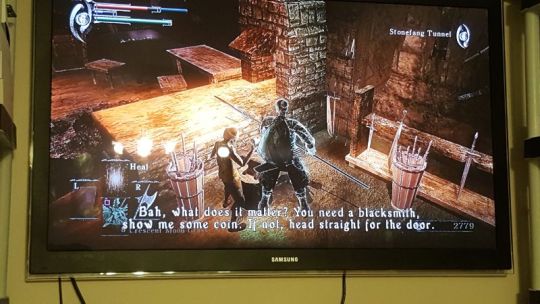
But also can be ridden further down to another blacksmith, Ed, who looks a lot like the blacksmith in the Nexus. Are they brothers, maybe?

A lot of the enemies here drop upgrade materials, so I’m able to push my Halberd up to +5. Nice.
Going forward there’s another neat shortcut where you re-direct some water that was pushing a water wheel to dump it in an area that was covered in lava right near the first shortcut, creating a new path forward. It’s really clever, and a lot more interesting than a simple one sided gate or elevator.

Past that there’s another pyromancer in a room full of exploding barrels. The trap’s pretty obvious, though, so I’m able to bait out a fire attack and avoid the explosion... though the pyromancer does kill me once after that anyway. Thanks to the shortcuts it’s a really quick run back, though.
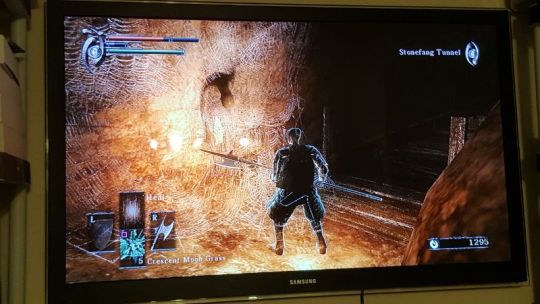
Past that, there’s some deeper tunnels, getting into a proper mine area, and I’m noticing a bunch of spiderwebs w/ corpses stuck in them. Looks like a spider boss is coming.

Down a deep elevator and... yeah, you can’t really see it in this picture, but past that fog wall is definitely a cluster of read glowing eyes in a spidery type arrangement.
I could dash in and check it out... but I’m not ready for a boss yet. I’ve still got a few worlds to visit before I regain my human form.
1 note
·
View note
Text
Short Film Production Editing Blog
Week 1 - 21/10/2019
We met in our production groups and talked over the film idea that we had been assigned. The idea is based around a theatre student who is performing in a play and gets too deep into the role and the mind of this character. With this idea being a thriller, my instant thought was that it would be similar to the story of Black Swan. With this to go on, I knew I could look at Darren Aronofsky and Andrew Weisblum and the techniques they used to tell the story as well as manipulating the audience’s emotions.
At this point, a story and script were yet to be developed so I decided to research film editing in general. I had already read On Filmmaking by Alexander Mackendrick which has a section on editing and decided to revisit that. I also read In The Blink Of An Eye by Walter Murch which explained the early concepts and techniques of editing video shot on film.
Week 2 - 28/10/2019
Speaking to the producer, I gained more of an idea of the story which is about an actor struggling to separate his private life with his life on-stage. With this in mind, the idea of representing and transitioning between his two lives became apparent and the producer had asked me to look into some CGI mirror effects and how we could remove the camera from a shot. From my own personal interest in CGI and movie special effects, I knew that one of the ways this would be possible would be to shoot a green screen in place of the mirror and then compose a separate shot of the reflection on top. The first thing I did was research how to achieve this kind of effect on Avid Media Composer and found a tutorial on YouTube:
Media Composer - Basic Motion Tracking 101: https://www.youtube.com/watch?v=AUY9fYZ5Glw&t=794s
The tutorial covered the basics of composing one shot on top of another through motion tracking. The only problem with this was that it used an older version of Avid and I would have to also find out how to do it on the newest version. This video helped in that through following the steps, the effect seems straightforward to achieve and so I thought that, with my limited experience, I would be able to do it.
In terms of the logistics of setting up this kind of shot I decided to meet with the module leader and discuss whether it would be feasible in reality, and the best way to go about setting the shot up. From the meeting I learnt that the majority of this shot would be gained in the actual shoot of the film as we would need to match the lighting and angles of the two shots to make them look realistic and convincing. If we got these shots, then the actual compositing of them in Avid would not take up too much time.
Week 3 - 05/11/2019
This week we met in our groups and talked more in depth about the production and our individual roles. We talked about the story and what happens so that we can better research our own jobs. As the editor I will look into films that deal with the same themes of obsession, commitment and theatre acting and see how the editors of those films chose to show those different themes. I will also look at the colour palettes of these films to prepare me for colour grading the final look of the film as well as research further into how to accurately achieve the look and feel that the director and producer are wanting. We decided as a group against the mirror shot as it would be too difficult to match the shots and do the post production on them. It would have taken up a lot of time just for one small shot that wasn’t significant to the story.
Week 4 - 12/11/2019
This week on the workshop we learnt how to colour balance and colour grade in DaVinci Resolve. This workshop was particularly interesting for me as this is going to be one of my main jobs on the production. We practiced balancing and grading video clips in the workshop which was very useful as the tutors were on hand to help with any questions. I have never colour graded any footage before and so this was a good introduction for me as it enabled me to practice before the final production. We also learnt how to use the university servers so that we can upload the footage and have it be accessible on different computers. Uploading and managing the footage for the film was one of my main jobs and while it appeared confusing at first, it saved a lot of time during the edit as I learnt more about the software and using Avid.
Week 5 - 19/11/2019
This week I carried on with some more research and tutorials as the director and producer were working out and writing the script. I decided to further research my role and look into colour correction and grading. I started by watching some videos on YouTube to help me with the basics starting with:
DaVinci Resolve 16 Basic Color Grade Tutorial
https://www.youtube.com/watch?v=t8lXqB_4lZM
This video covered the bare basics of DaVinci Resolve 16 and, even though we covered it last week in the workshop, it still proved to be valuable. It gave an overview of each section of the Resolve window as well as what the most important functions are. It gave an introduction to the use of nodes and how to best use them as well as the basic functions of the colour wheels and how to best use them and just helped me to get a good grasp of the basics.
Alongside researching colour grading I also looked into colour theory and how it works for films. I found another YouTube video that explains the different aspects of colours, hue, saturation and brightness:
Color Theory in Film — Color Psychology for Directors: Ep5
https://www.youtube.com/watch?v=lINVnA3rVIE
The video explains how each aspect works, what effects they have as well as showing examples with film clips. I find that researching and learning these things through videos is beneficial because it is easier to explain, and you can see examples of how things affect the image.
Week 6 - 26/11/2019
This week was the first week of our filming and I was on set to record the sound. We had two locations to film this week with the first being a bedroom set for all of the bedroom scenes. We shot these scenes on the Tuesday and Thursday as they were the only days the room was available. With my main job on set being to only record sound, I also helped set up the camera, the tripod, the lights as well as dress the set ready for filming.
This week we also filmed the kitchen scenes on the Wednesday and Thursday. As with the bedroom set, my main job was recording sound so again I helped set up the equipment and dress the set.
After every day of filming, the footage was copied over onto an external hard drive so that at the end of the week I could upload what we had shot so far onto the university servers. I also started putting together a basic edit of the film from what we had.
Week 7 - 03/12/2019
This week we had a few more things to shoot in the kitchen scene and then I started working on a rough cut with footage we currently had. There were issues with booking and gaining access to locations, so we didn’t film for the rest of the week.
Week 8 - 10/12/2019
This was our second week of filming and we only had one location left to film which was in the university theatre. There was a lot of shots to be filmed in this location and so we spent all of Monday, Tuesday and Wednesday filming just these scenes. Again, my main job was recording sound but, in this location, we also had access to the stage lights which really helped in getting a correct ‘stage’ look.
Once we had completely finished filming, I uploaded the rest of the footage onto the university servers so that all of the clips were in one place and ready to be edited.
Week 9 - 03/01/2020
This week was the start of the final edit with all of the footage. I already had a rough cut and started to build the rest of the scenes around what I already had. I decided to organise my project into separate bins for each individual scene so that I could work on them independently to make sure they worked on their own before combining them all at the end. One of the difficulties of organising the clips was that all of the individual takes did not transfer onto the server in any particular order, so I had to go through and watch each take before working out what scene it was part of. This did get confusing as further down the line I ended up with takes that I couldn’t find and found out that they had been accidently put into the wrong bin. Once all of the clips were organised into their respective bins, I could then start on building up the stage scenes and fine tuning the bedroom and kitchen scenes.
There was one bedroom scene in particular that I spent some time on as it required a few effects to get the desired result. The shot is of the protagonist, Jack, who is sitting at a desk while two separate versions of him are sticking notes to the wall all within the same shot. On the shoot, they filmed the scene three separate times without moving the camera so that I could line them all up easily in post-production. The idea was to have the figures on the sides of the frame to be sped up with added jump cuts to give the impression of time moving fast while Jack was sat in the middle at the desk. I had originally planned to layer each shot and then crop the edges of the frames so that they would all appear in the frame together. Unfortunately, when it was being filmed, the moving parts of the shots, in this case Jack, overlapped and therefore part of the shot was cut off. To fix this I had to use the 3Dwarp effect on each shot and adjust the transparency so that you could clearly see what each version of jack was doing while still retaining the time lapse effect.
I also sent a version of the edit of what I had done so far to the director and producer so that they could see the progress as well as give me some notes on any changes they think I should make.
Week 10 - 06/01/2020
This week I started to make changes to the edit from the notes that I was given by the director and the producer. These notes were mainly changes to certain shots and the order of certain parts that was different from the script. This week mainly consisted of making sure all of the cuts and edits were tight. I also started adding effects to certain shots that required it. In particular there is a shot in the film of a close up of a particular line in a script that you are supposed to be able to read on screen. There wasn’t a clear or stable enough shot filmed for me to just insert into the edit and so I had to add some effects in order to achieve this. It was quite straight forward as I first added a stabilizing effect to reduce the movement of the shot and make the line readable. I was also able to change the tracking so that the line remained relatively central to the screen. I also added a zoom so that you could read the line easier and also to make the cut between shots smoother and more motivated. I also had to slightly zoom in on a few shots so that the aspect ratios matched with the rest of the shots which was a result of filming on two different cameras.
There were a few basic transitions to be done throughout the film, but they were just either fading to or from a black screen or fading between two different shots. These were easy to do as I just added a dissolve using the quick transition tool and set the parameters to what was needed.
At this stage there were some changes to the script and some extra dialogue had to be recorded and added in. I recorded the lines for the role of the doctor using Audacity in the edit pods and imported them in which proved easier than I thought. There was also another VO for the character of Jack’s sister which was recorded by an actor and then sent to me so that it could be edited in.
One of the last things to do before the colour grade was to add sound effects and music. There were only a few sound effects that had to be put on after which couldn’t be recorded on the day of filming. These sounds were found on the internet and were added to the morning scenes to give them a bit more life than just having music. Cheers and applause sounds were also added to the last scene to give the impression that he was being cheered on stage at the end of his performance. The transitions of the sound were done much in the same way as the clips. I used the quick transition tool to do simple fade in and outs but on some clips, I had to manually adjust the volume so I could be more precise with the levels. We used the same piece of music for the three separate morning sequences to give them consistency and make it a repeating motif that the audience can recognise.
Once sound had been edited the last thing to do was the colour grade. This was done in DaVinci Resolve 16 and proved a challenge as none of the shots had been white balanced on set. I spent most of my time making sure that all of the shots matched up visually by trying to match the skin tones of the main actor. Once I was happy with them all looking the same, I looked through the LUT’s to see if there were any appropriate to the film. I felt none of them did the film justice as they all looked a bit intense and fake. I ended up just adding a film grain to the whole project to remove the digital crispness and give it a slight cinematic look. I also added a slight vignette which really helped add to the film look. Once the grade had been finished it was just a case of exporting the film and submitting it.
Critical Analysis
I feel that the final film has a professional look and that the desired style was achieved but unfortunately, I think that it struggles narratively. Going into filming we all knew that it was going to be a complex story that smoothly transitioned between two locations to imply the sense of confusion and madness that was going on in the protagonist’s life. Towards the end of the edit, the voice overs by the doctor and Jack's sister were added to give some clarity towards what is supposed to be happening in the story, but I feel that it was added too late and now comes across as a bit of an information dump.
Some of the shots look a bit awkward as the director had planned on some complex camera moves to give the impression of long, continuous shots but I felt these didn’t come off as well as they could have and so had to edit them together so that they had better pace within the film.
I felt like the music could be more appropriate to the film as well as it is a very famous piece of music and I feel that while watching the film, you start to focus on the music as opposed to it complimenting what is happening on screen. I also felt that it was too melodic which made it a problem to edit as it tended to fade out or cut in the middle of a melody.
Overall, I think that the film has a good look to it and has its own sense of style, but it just falls short of telling a story as well as it could have.
1 note
·
View note
Text
#personal
Home has been pretty peaceful lately as opposed to the outside world. I think I’m getting less sensitive about things when I step out the door or at least how they project back to me. Opinions about you never really go away. Sometime that’s fair enough. They can evolve or dissolve depending on your level of engagement and accountability. I don’t expect a lot out of people in this city anymore. If I dwell on the past I get angry and maybe rightfully so. Expressing that anger doesn’t change the past. It’s a waste of breath and a poor excuse to raise your blood pressure. The mind fuck of it all was knowing you did the right thing by clocking out of society. Living with that decision years later is still perplexing. It is silent enough behind closed doors where I’m able to sort through my emotions more. They don’t bubble up to the surface all at once. I do get triggered, depressed and agitated often. Life right now is not an ideal situation at times. They say without struggle art cannot truly exist. I’m not an artist. I work at an art school by day. I have a failed music career to bury at night. I still post up tracks here for the sake of context. There’s no way I’d even consider the fight to get back into music and fame. I have no desire to bring that chaos back into my life. It doesn’t pay enough for the time spent and I don’t particularly enjoy it anymore. Kind of like quitting drinking three years ago. Although I would never even consider drinking again. It just isn’t me anymore. What is me is probably most apparent on this blog from week to week. This space is kind of like home to me. A place where I can be honest and at least know people will appreciate the context. It’s a narrative in a vast swarm of overlapping conversations much like life. It gets passed over more often than you would think. The deafening visualization of being completely invisible after all this would scare most people. To me it’s more scary to know why I’m so far off the radar. I’m a person people talk about for sure. It is awkward to know that it does nothing for me. In fact whatever compounded interest I’ve gained from being infamous has broken large portions of my life. I would argue they weren’t worth fixing so I moved on and evolved into the Tim you know. The Tim that keeps to himself on the weekends and sticks to the plan. Whatever plan that is. I don’t really know right now what is going on with my life. I know what bills I have to pay. I know how to do my job. I know I worry more right now about the cat I let into my home than the news or politics. And I know it probably shows more about me as a person how I treat the things in my life I care about. So there isn’t really much to prove except how far I can advance in World of Warcraft before the level squish. What a great start to a cold brutal winter.
I do continue to enjoy my life. It sounds so persistent. Almost like a MMORPG. Real life sims has me more focused on my cat’s diet than revolution overseas. Since she’s been inside I’ve found she’s doesn’t take to dry food well. Most cats don’t. She threw up just outside the litter box. She’s been eating wet food more tolerably. I gave her a bath too so that might have something to do with it. I left her home two days in a row. The other tabby still shows up on the doorstep but that’s a more complex operation. I’m still not sure two cats is the right decision. She acknowledges the other cat still but generally prefers to stay inside. She’s makes it a point to trot to the kitchen when I open the door at the opposite end of my apartment. I try to pay attention to all of this to make sure she adjusts well. But really at the end of the day I just adopted a stray cat into my life after three years. The last two cats I had inherited from a previous relationship. I watched both die. One was quick. The other a couple of days. But I lived with a complex grief for a long time only to have another life waltz back in. Such is the cycle of life. Persistent and amazing if you pay attention. Which might explain how magic in life actually happens. We focus on so many trivial arguments with no real intention on acting on any of it. And the real opportunities just drift on by. I’m right here. Little moments over the years I seized brought me to this moment in the kitchen. A living and breathing calico cat sitting at my feet as I write this. A reflection of what I choose to surround myself with that came out of nowhere. Another quiet and well behaved presence. Real recognize real I guess. I’ve seen a raccoon wandering around gangway. I’ve held a raccoon in my arms in South Korea the very last time I visited. I’m not adopting any trash pandas any time soon. But if you ask me what really interests me and speaks to me you’d know I’m right where I need to be. Nobody asks. This is why I love animals so much. They don’t understand a word you’ve said. They don’t pretend to. They have their own language. English doesn’t mean shit to them. No matter how many complex words you throw at them. They do understand the kindness you give. Human beings are another story. I am sincere sometimes to a fault. I think we all can be. It’s awkward when someone doesn’t realize you were just trying to be genuine. Because they can’t see genuine in themselves I guess. But when you’ve been genuine now for decades it’s alarmingly real to know how opposite the world really is. It is punishing to be ignored. To watch literal sacks of shit parade around in their greasy ass aesthetics and talk loudly about how great they are. The great work they do. They work other people did that they take credit for. If people can’t see, appreciate and respect your own value it’s like pushing a boulder uphill. It’s looks strenuous proving your right to breath to people who’ll never care enough to hear your side of the story. So I just let the boulder roll down the hill and find another grassy knoll to picnic on. That’s a Robert Kennedy joke. Or maybe even Oliver Stone. Way to stay edgy regardless.
I do recognize that people actually value my opinion these days. I don’t think I would have gotten invited to do product reviews for Japanese apparel companies if they didn’t. That’s a strange thing to realize you are evolving into. That people trust my take on things I spend money on. It gets somewhat annoying in public. There’s some very real utility in putting the data out there when you write a review. I write here weekly enough to know I’m kind of reviewing my own life. My glowing one star rating isn’t a real sell I’m aware. When you’ve tried so hard to get where you need to be and been largely ignored and picked over it’s easy enough to feel worthless. But the internet is a persistent and relentless timeline. It’s hard for people to forget what you’ve done. They always dig it up years later and throw it back in your face when you run for office. I don’t particularly have much to hide after all these manual scrobbles into my history. You’d think people would just know by now. And maybe they do. They just don’t care enough to respect anything but themselves. They misread the results and warp the information. That’s why I talk less in public. The public record of passing conversation is very unreliable. Look at the impeachment investigation. I keep all my love letters on a private server encrypted twice over in plain sight. The reliability of the testimony of the only sworn witness being myself. I’m never going to run for public office. The most I ever want to be is a father and a loving husband. For now I babysit cats and try to be a good manager. If somebody asked me point black what I care about you know how I would respond. And nobody ever asks I think because they don’t want to hear the truth. They don’t want to believe I’m on the right track. What does that say about the rest of society if the best thing for me is to stay indoors, pay my utilities and play Blizzard games in the face of fascism. I’m still amazed people justify eating Chik-Fil-A in an arts environment. I’m almost surprised when I call people out on it they just ignore me and continue on lusting after that chicken sandwich. I buy enough Bell and Evans frozen chicken to know. But when there’s an excuse to talk about Hong Kong freedom I have to face the music. Does any of it matter outside the space of the water cooler in reality I’m not sure. That’s not my place to speak on it apparently on either side of the argument. I’m a captive audience. And this probably points to the huge disconnect at the center of all these well meant discussions. It’s not a conversation. There’s debate but no compromise. Just performance. In hindsight it doesn’t really change the situation at hand. There are things you can change where you are at right now. The life you have control over. That life is my own. I have made conscious acts to do better. I live in the wake of that. I enjoy where it’s brought me. I don’t think I’ve even started the bulk of the journey yet. But I’m not going to sit here and be miserable about it. I don’t have any guilt about the way I choose to live after all these missteps and doubts. I just keep writing the same old shit until I sound more sure about it. I’m sure I am enjoying the Mandalorian for the second time in a row. And I’m sure I’ll be around to tell you more about it next weekend. Everything else I’m not so sure about will work itself out in time. That’s not my decision to make. I have a safe place to wait out the process. Edgy memes and political jokes nothwithstanding. <3 Tim
1 note
·
View note
Link
via Politics – FiveThirtyEight
Welcome to FiveThirtyEight’s weekly politics chat. The transcript below has been lightly edited.
micah (Micah Cohen, politics editor): Here’s my plan, if it works for everyone: The overarching question will be “Is James Comey’s book/publicity tour helping or hurting the case against President Trump?”
You can interpret “the case” however you want, but I mostly mean it politically.
To give the convo some structure, we’ll go through the six claims Comey makes that are highlighted in this BBC article and say whether each helps or hurts.
Ready?
perry (Perry Bacon Jr., senior writer): Sure.
natesilver (Nate Silver, editor in chief): Let’s go!
clare.malone (Clare Malone, senior political writer): Ready.
micah: Also, FiveThirtyEight Features Editor Chad Matlin is obsessed with the Comey story, so he’s lurking in this chat and is going to chime in occasionally.
chad: Point of order: I am obsessed with Comey as essentially a character out of a literary political thriller. He’s flawed in all sorts of ways that make him extremely compelling and unable to be plopped into a villain or hero bucket. He essentially admits that he has an ego and a devotion to integrity, which makes it very fascinating to try to tease out where one starts and the other stops.
clare.malone: Hubris!
I agree, Chad.
He is a character who has tangled thoughts on his own actions.
micah: No. 1:
“When asked if he considered Mr Trump fit to lead, the former FBI director said he did not believe claims about Mr Trump’s mental health, but did see him as ‘morally unfit’ to be president.”
Help or hurt?
clare.malone: Hurt.
natesilver:
clare.malone: I’m less concerned with whether Comey thinks Trump should be in office: We care more about Comey’s observations of his interactions with Trump — whether or not he thinks the president obstructed justice, etc. At least, I think we should care more about those.
micah: The media doesn’t seem to care more about that, Clare.
clare.malone: Well, like Comey, I am a morally superior force in the world, Micah.
I am SANCTIMONY embodied!
natesilver: Yeah, I don’t really give a fig about Comey’s view on Trump’s character, except to the extent it reflects proprietary knowledge that Comey has based on working with him. Instead, the assessments Comey makes about Trump in the ABC News interview seem very arm’s-length — as though he’s a political pundit.
perry: Helps. I think someone of Comey’s stature saying that the president is “morally unfit” is important. He is kind of echoing the Never Trump/John McCain/Jeff Flake view, which is not a hugely influential one, but it does have some influence, so it’s part of why Trump is fairly unpopular.
micah: DISAGREEMENT!!!!!
Clare and Nate, why do you think Comey-as-pundit hurts the case against Trump?
clare.malone: Because it distracts from the narrative that actually matters: Comey’s word against Trump’s on a number of occasions where it is a he said/he said.
I don’t think Comey needs to bolster his argument by being bombastic about Trump being unfit.
natesilver: Yeah, it lowers his stature. Comey’s authority comes from having had a seat at the table and having seen Trump up close and personal — not from having particularly good judgment, since there are all sorts of questions about his judgment.
clare.malone: He already has a good reputation as a man-of-the-law, truth-teller type.
natesilver: Right — I think a Chief Justice John Roberts “My job is to call balls and strikes and not to pitch or bat” demeanor would serve him better.
micah: I mean, let’s say Comey has the influence Perry mentions with ~3 percent of Americans — that’s something.
I just don’t know if there are really any neutral observers anymore.
OK, No. 2:
“Another portion of the interview handled the sacking of National Security Adviser Michael Flynn in February 2017 for lying about contacts with the Russian ambassador in Washington. The former FBI head said Mr Trump had tried to pressure him into dropping any investigation into Mr Flynn. ‘I took it as a direction,’ he told Mr Stephanopoulos. ‘He’s — his words were, though, “I hope you can let it go”.’”
Help/hurt?
clare.malone: I think help. He’s being honest about the words, but also his interpretation of them — which presumably includes the way the president said it, the tone, emphasis, body language.
natesilver: Help, I guess … but wasn’t that news already public like six months ago?
clare.malone: It’s Comey being transparent about the interaction.
perry: I don’t know if this one matters as much, because this is basically what Comey said last year during the Senate hearing, as Nate said. He put the legal term “obstruction of justice” in there, but this is the core of what he told the Senate back last year.
natesilver: Yeah, I’m gonna say neutral because there’s no news there.
clare.malone: Repetition of relevant facts matters.
So, it doesn’t hurt.
natesilver: I’m a Bayesian, Clare, and it didn’t cause me to update my priors.

micah:

clare.malone: I don’t even want to dignify that one. Next!
micah: No. 3:
Comey said:
“I think impeaching and removing Donald Trump from office would let the American people off the hook.”
So Comey is anti-impeachment.
Help/hurt?
clare.malone: I don’t actually know how I feel on this one. Sticking by my original logic of “No one should really care about Comey’s feelings about things outside what happened between him and the president,” I would have to say this hurts, since it’s a distraction from the main message.
On the other hand, I guess if he’s trying to look more even-handed and less “Never Trump,” then this is perhaps helpful?
For the sake of consistency, though, I’ll go with “hurt.”
natesilver: I don’t really think it helps or hurts the case against Trump per se.
micah: Let’s get a dose of Chad here.
chad: It hurts, since Comey’s dismissal is what the left uses as proof that there was obstruction of justice. So if the guy who got fired says his firing isn’t enough, then that perhaps has some weight. Since obstruction is fuzzier than Democrats would like.
natesilver: But I sorta agree with Comey that elections are an underrated remedy as compared with impeachment.
clare.malone: Nate, you have to pick one or the other! Help or hurt!?!?
Isn’t that how this game, goes!?
natesilver: Fine.
clare.malone: I love that song.
chad: Nate, please don’t make me reveal your karaoke song.
natesilver:
perry: Hurt. I thought Comey’s anti-impeachment stance was interesting. The legal case against Trump (obstruction of justice, etc.) and impeachment are not exactly the same thing. There is a broad coalition of anti-Trump people, from Never Trump Republicans to the Democrats who are already in favor of impeachment. If Democrats win the House, you’ll see the divide between the pro- and anti-impeachment forces. And I think Comey’s view here is important. He is a sharp Trump critic, but he’s warning against impeachment. We’ll likely see some Democrats outside of the party’s most liberal wing echo what he is saying: Let’s beat Trump in the election, not try to impeach him.
micah: So, I’ve largely resisted all the Comey character analysis and ranting about how he affected the election, but I have to say: I found the fact that Comey — the person who arguably threw the election to Trump — used the phrase “let the American people off the hook” pretty galling.
clare.malone: Why, Micah?
micah: Because he sends this letter days before the election that has a meaningful effect, and then sorta chastises the American people to basically “clean up their own mess” — at least, that’s how I heard/read it.
clare.malone: He’s right in some sense, that, say, Republicans nominated Trump.
perry: I think that was his goofy way of saying that the best way to get rid of an unfit president is through the electoral process. I don’t think he was really attacking the voters.
clare.malone: (I knew I was going to get the letter argument, but I do think that we should also remember Comey is probably a pretty disillusioned REPUBLICAN.)
micah: OK, yeah, I agree with him on the merits — elections > impeachment — but he’s not in the best position to tell voters what they should or shouldn’t do during an election.
Next:
“In the TV interview, Mr Comey said his belief that Hillary Clinton would win the 2016 presidential elections was a factor in how he handled the investigation into the Democrat candidate’s use of classified emails on a private server while she was the secretary of state. ‘I was operating in a world where Hillary Clinton was going to beat Donald Trump,’ Mr Comey said.”
natesilver:
clare.malone: Yeah, that’s a hurt.
That just makes his reasoning for his public statements look … sloppy. Because his whole thing has been, “I was acting by the letter of the law,” but obviously the heightened atmosphere of fall 2016 played a part in his ultimate decision.
natesilver: Throughout the ABC interview, Comey seems extremely preoccupied with appearances — both how he’ll be perceived and how the FBI will be perceived.
Yet he sorta concedes that what he’s doing is against Justice Department protocol.
clare.malone: Right.
natesilver: And paints himself as being in a no-win position.
But one nice thing about having protocol and rules and regulations is that they give you a good default answer in no-win situations.
micah: If I could give one piece of advice to the political left, it would be: Accuse everyone of bias against you. That strategy, which a portion of conservatives have used for decades, seems to have all kinds of political benefits.
clare.malone: I mean, the Bernie Sanders people got that memo.
(Not to dredge up old fights …)
(But bring ’em on, I guess.)
perry: This posture in the interview about the Clinton investigation helps the case against Trump in that it weakens the “investigate the investigation” crowd on the GOP side, who say the real crime was Clinton’s behavior, not Trump’s. I thought, with what Comey said about Clinton and former CIA Director David Petraeus, who resigned after a scandal in which he mishandled classified information, Comey exonerated Clinton a bit more publicly than he has before. He all but said, “I have seen real email/documents abuse, and Hillary Clinton didn’t do it, but Petraeus did.”
micah: A lot of this seems to come down to credibility to overcome partisanship. Perry, it seems like you think Comey has at least a dollop of that power?
natesilver: There are a lot of parallels between how Comey saw the various scandals and how the press covered them, including wanting to appear tough on Clinton so as to seem nonpartisan.
perry: I’m not sure if Comey or anyone can overcome partisanship. But I think the media is playing a huge role in the Russia investigation process and struggling with questions of telling this story in both an accurate way but also not being perceived as biased against Republicans and Trump. So an independent authority like Comey saying that Trump’s behavior was more questionable than Clinton’s could affect media coverage, if not the public at large.
clare.malone: Is Comey independent, though?
micah: I’m sorta moving in Perry’s direction a bit — if you follow the news super closely, I think Comey at this point reads as fully immersed in the political/partisan fight; he’s “anti-Trump.” But maybe if you’re only paying attention peripherally, “former FBI director” is what really comes through.
Like, resume-wise, Comey is as independent as they come, Clare.
clare.malone: But right now, in our present reality, is he independent?
Maybe.
Maybe not.
micah: He’s just not keeping up appearances.
natesilver: In the interview, he comes across as part of #TheResistance.
micah: Right.
chad: That says more about #TheResistance than Comey to me.
natesilver: Ehh … it’s not that interviewer George Stephanopoulos grudgingly coaxes answers out of him. Comey seems pretty eager to volunteer his opinions on Trump.
chad: Is Comey playing too much on Trump’s turf, given the personal observations and attacks? Does that weaken his argument? Or strengthen it because those comments are more likely to provoke Trump?
perry: I don’t know that him talking about Trump’s hand size was useful. Or his face color or height. That part of it was problematic.
natesilver: The answer to Chad’s question is:
He’s definitely playing on Trump’s turf by making it personal.
clare.malone: Yeah, it’s not a good look.
chad: Before Trump was elected, Omarosa said all would have to bow down to Trump:
While that was overstated, I do think that there’s a kind of Trump vortex in which people feel they need to fight him on personal terms because his way of argument is so personal and ad hominem. Sen. Marco Rubio had this problem in the primaries, when he tried to fight Trump on Trump’s terms and lost.
natesilver: And Trump doesn’t hugely mind picking a fight with Comey if they both get muddied up.
clare.malone: Comey’s whole thing should be “Caesar’s wife must be above suspicion,” and he’s not making himself above reproach.
perry: Here’s that Comey quote from the book:
“His face appeared slightly orange, with bright white half-moons under his eyes where I assumed he placed small tanning goggles, and impressively coifed, bright blond hair, which upon close inspection looked to be all his. …
“As he extended his hand, I made a mental note to check its size. It was smaller than mine, but did not seem unusually so.”
In the interview, Comey said: “His tie was too long, as it always is … he looked slightly orange up close.”
This all is kind of petty to me.
It’s like how I imagine Russell Westbrook talks about Kevin Durant in private.
clare.malone: Yeah, his editor did him a disservice there. Either in making him put that in or not taking it out.
chad: My thought: Trump is protected politically because of the base, so his detractors have to resort to attacking him personally. But personal attacks are priced in at this point — the people who want Trump out (whether by impeachment or voting) need to start chipping away politically to gain any traction, in my opinion.
micah: #analysis
Next:
“The former FBI boss writes that on at least four occasions Mr Trump raised the matter of unverified claims that he watched prostitutes urinate in a hotel suite during a 2013 Moscow trip.”
natesilver:
Or maybe that statement alone doesn’t hurt … but Comey seems quite interested in gossip about the pee tape, without really providing much substantive insight into it.
He seems too eager to speculate based on incomplete facts.
clare.malone: I honestly don’t know what to think about this one.
Because Comey offers us no further evidence that he knows whether or not this is likely. He just points out that the president was fixated on it.
But like … if someone told me Russians had Kompromat on me, I’d be fixated too!
perry: I’m confused by this one. I think this is the most outlandish detail of all of the Trump scandals. I have tended not to believe it. I’m not sure Comey should have discussed it unless he had real proof. But Jonathan Chait wrote an interesting column recently on why we should consider if the “pee tape” accusation is true. And Comey’s account makes me believe it more, if only because people don’t deny very outlandish things on four separate occasions.
natesilver: But shouldn’t Comey have more insight about this than Jonathan Chait? That’s not meant as an insult to Chait, it’s just that you’d think you’d have a lot more info as head of the FBI.
clare.malone: I mean, maybe some of the stuff he can’t share publicly?
I don’t know.
I think the Steele dossier stuff is a bit distracting, I agree with all of you.
natesilver: Maybe, but Comey can be a very precise communicator when he wants to be, such as in testimony before Congress — he knows how to hint when he has more information than he can reveal publicly.
In the pee-tape stuff, he sounds like a political pundit speculating and gossiping instead, based on having no particular inside info.
micah: I wonder how knowing much what Comey knows and can’t say would affect how we’re reading all this.
perry: I actually think one thing that helps the investigation is what he did know: Comey goes into some detail in the ABC News interview to both 1. say the Russia investigation started with campaign advisers Carter Page and George Papadopoulos, not the dossier and 2. that he considered Steele reliable based on previous work he had done.
Deputy Attorney General Rod Rosenstein/FBI Director Christopher Wray/the DOJ/the FBI have hinted at this, but can’t say it as explicitly because they are in office now and it would piss off Trump and some of the Republicans in Congress.
natesilver: I guess I just think that Comey doesn’t stick to a just-the-facts posture and that undermines his position.
chad:
My favorite line from the Comey transcript so far: pic.twitter.com/ONadbSoWXz
— Jonathan Chait (@jonathanchait) April 16, 2018
natesilver: I found Comey’s Congressional testimony very compelling, by contrast, precisely because he avoided speculation.
micah: OK, so we already covered No. 6 (Comey’s comments about Trump’s hair and hands), so let’s end this with … AGGREGATE HELP/HURT.
Overall, is he helping or hurting the case against Trump?
clare.malone: Hurting his case, overall.
natesilver:
chad: Nate, I’m curious: I know that not sticking to a just-the-facts stance undermines his argument for you as a data-/evidence-based journalist. Do you think it does the same for the public at large?
clare.malone: It makes him into a more entrenched partisan figure I think, Chad.
micah: But, to Chad’s point, couldn’t we just as convincingly argue that Comey’s flare for trolling and the lurid detail he uses helps his case by getting it more attention?
natesilver: It’s hard to know for sure, but I think the stuff about being influenced by the polls is pretty damaging, as are the personal comments he makes about Trump’s appearance.
micah: Hmmmm … I’m starting to wonder whether we’re all being a bit too highfalutin. Donald Trump won the White House, after all.
perry: Nate made the right point: Comey’s testimony on the Hill. His Hill testimony was powerful, detailed, precise and impersonal. The book/interview stuff I have seen (I haven’t read the book) has not had that same discipline. Comey has the right to write a book that maybe is more interesting, and maybe “interesting” for him or his editor means going beyond what he said on Capitol Hill.
But some of the details are not enhancing his reputation for seriousness
natesilver: “Discipline” is a great word here. If nothing else, Comey had a reputation for being a disciplined guy. But he doesn’t come across as disciplined in this PR tour. Nor does his thinking around key decisions in 2016 seem to reflect especially disciplined thinking.
perry: Part of the issue is that Comey last year basically cast the president as a bully trying to obstruct justice in his notes that got published in The New York Times, and he got a special counsel appointed and then bashed Trump on the Hill in a heavily watched hearing.
He has already helped the anti-Trump case a great deal. Beyond having tapes of Trump saying the things that Comey purports he said, I would have a hard time thinking of how Comey could be a bigger part of the case against Trump.
He may have set a standard that is hard to top.
micah: Well, he could have tried to maintain his reputation for discipline and soberness.
Anyway … that’s a WRAP!!! Last bite goes to Chad!
clare.malone:

micah: Take the last piece of pizza, Chad.
chad: Really excited for Rosenstein’s book.
1 note
·
View note
Text
[SA] Report + Reflection
Over the course of 5 weeks, I’ve learned how to use a multitude of different tools. For each CTF, I’ll give a summary of my process, as well as what I learned.
Hacking into HTB (link)
Process:
Skimmed through the HTML, JS source code for any potential vulnerabilities.
Found a makeInviteCode function in the JS file, executed it in the browser console.
Decoded results in a base64 decoder.
Sent a POST request to decoded result URL.
Decoded results from the POST request response.
Final decoded output was the invite code, which was used to make the account.
Learning outcome(s):
Learned how to make use of the browser console to execute JS functions.
Learned how to use cURL POST requests to a URL, and how to read the responses.
HDC (link)
Process:
Skimmed through the HTML, JS source code for any potential vulnerabilities.
Found a doProcess() function in the HTML source code.
Looked through multiple JS source codes for the doProcess() function.
doProcess() function contained a username and password, which was then used to login to the website.
Found an image icon with a URL ending in /secret_area which contained a .txt file containing name and e-mails.
Using the website’s e-mail function, manually brute forced each e-mail with a dummy message.
Found the flag from a response to the e-mail.
Learning outcome(s):
Learned how to make use of Chrome’s “pretty print” option to make bunched-up, one-liner JS legible.
Learned how to go through and access simple website directories to gain private information.
Lernaean (link)
Process:
Brute-forced the login page using Hydra.
Interrupted the login POST request form using Burp Suite.
Viewed the response to the login POST request, which contained the CTF flag.
Learning outcome(s):
Learned how to use Hydra to brute force passwords, given a dictionary of commonly used passwords.
Learned how to use interrupt POST requests using Burp Suite, including how to filter out undesired requests and responses
Learned how to read web responses, particularly from user-sent requests, using Burp Suite.
Cartographer (link)
Process:
Performed a SQL injection on the login form.
Trialed different methods to find the correct action query.
Revealed flag after finding the correct one.
Learning outcome(s):
Learned how to execute a SQL injection on a login form to gain access to an account/website
Developed a better understanding of URL forms
In retrospect, what I was supposed to do instead of randomly guessing was to using wfuzz and look for any hidden commands. What I did was replace the query multiple times until I got the right answer, but fuzzing it such like panel.php?info=FUZZ would have “correctly” gotten me the right answer.
emdee five for life (link)
Process:
Created a python script that would:
Open a session given the URL
Extract the to-be-extracted string
MD5 encrypt this string
Send a POST request via a submit form
Flag was revealed in the POST request’s response
Learning outcome(s):
Learned how to use the basics of the sessions module of python to create an online instance of a website.
Learned how to send POST requests using python.
Learned how to do basic MD5 encryption within python.
Learned how to use python as a method for executing web hacking scripts
Fuzzy (link)
Process:
Used wfuzz to locate any hidden directories - returned cs, jss and api.
Used wfuzz to locate any hidden files in api - returned index.html and action.php.
Used wfuzz to locate any viable URLs in action.php - returned ?reset=X.
Used wfuzz to locate any viable parameters in action.php - return ?reset=20.
Flag was revealed after typing in the full /api/action.php?reset=20 URL.
Learning outcome(s):
Learned how to use wfuzz to fuzz webs and brute force for any hidden directories, URLs, and php actions.
Developed a better understanding of how to fuzz web pages/applications.
I know mag1k (link)
Process:
Created an account using the website’s account creation functionality
Intercepted log-in POST request, which revealed two cookies (sessionID and iknowmag1k)
Performed a padding oracle attack using PadBuster on the iknowmag1k cookie, given that the sessionID was the initialisation vector.
iknowmag1k cookie was revealed to an encoded message of my account name and role.
Encrypted a message using their format in PadBuster, and changed the role to admin instead of user.
Entering the website as admin reveals the flag.
Learning outcome(s):
Learned how to inspect cookies with Burp Suite
Learned how to alter and manipulate cookies using Burp Suite
Learned how to perform a padding oracle attack using PadBuster to decrypt a cookie
Learned how to perform a padding oracle attack using PadBuster to encrypt a plaintext to disguise a response as the original
Summary
Here are the tools that I’ve gained a solid understanding of, with regards on how to use them:
1. Burp Suite* To intercept POST requests and change cookies/parameters in a response form, amongst a bunch of different other functions. 2. Hydra To brute force passwords, given a plaintext dictionary of the most common passwords 3. wfuzz To fuzz for any hidden directories, web pages, or action text/parameters in any website, given a plaintext dictionary of the most common directory names 4. PadBuster To perform padding oracle attacks, given the initialisation vector and the text to decrypt *Understanding of Burp Suite is limited to using exclusively the Proxy/Interrupter and the Repeater tools.
Here are the web penetration methods that I’ve gained a solid understanding of:
1. SQL injections (SQLi) Although there are ways of automatically perform SQL injections, the one time I did it I performed it manually. I was able to perform it manually because my impression (that later turned out to be correct) of how the username and password was parsed was through the format of: SELECT * FROM [x] WHERE USERNAME=‘username’ and PASSWORD = ‘password By changing ‘username’ to username’||’1=1, and ‘password’ to password’||’1=1, I was able to make an OR statement that was always True, thus giving me access to website past the login screen. I used SQLi in this web CTF.
2. Directory brute forcing I performed directory brute forcing using wfuzz to scan for any hidden directories/actions/responses/parameters. In doing so I was able to access parts of the website that would usually be considered private. Fuzzing let me learn the importance of keeping hidden things hidden, preferably through keeping it password protected or not keeping it as a web page in general if it isn’t going to be used for purposes other than debugging (or something similar). I used directory brute forcing in this web CTF. 3. Python scripting Python scripting let me perform several requests at once, in light speed. I was able to hack into a particular web CTF through sending requests at an inhuman speed. I used python scripting in this web CTF. 4. Password brute forcing I performed a password brute force in Hydra. Given how shockingly easy it was to break the password, this taught me more than anything to keep my passwords secure by giving it a variety of characters, making it something uncommon, and to include a username as well to make the brute force harder. Or I could just use a password manager. I used password brute forcing in this web CTF. 5. Padding Oracle attack (for CDC block cipher encryption) Probably the most complex thing I’ve learned from this CTF journey. My understanding of how a padding oracle attack works is like this: 1. Plaintext messages often have to be padded to make each block being encrypted the same length prior to encryption. There are rules about how this padding is applied which are validated as part of the process. 2. Sometimes the server will try to decrypt your (tampered) encryption and say "I decrypted this and it's junk, I don't know what to do with it" and sometimes it’ll say "I decrypted this and the padding doesn't follow the rules." 3. As a result of the server doing this, combined with some complicated algorithms with the internal mathematics of these cryptographic systems, when the server gives you these messages, its actually enough information to start making assumptions about the internal state of the decryption operation based on what message it gave you. 4. Then continually ask questions and repeatedly send bad encrypted messages to gather more and more information about the internal state of the operation. 5. By doing this enough times, you can gather enough information to decrypt the message (and sometimes encrypt new messages). I performed a padding oracle attack in this web CTF.
The final outcome of my HackTheBox web CTF journey is:

It’s interesting to see how far I’ve progressed over the past 5 weeks. At the beginning, my experience in web hacking was exclusively just looking at the source code and trying to figure out ways of exploiting that piece of code - I’ve developed a better understanding of the different methods and tools that people use in web penetration. I’m able to use the attacks that I theoretically learn in lectures/tutorials and translate that into real, practical experience.
Overall, I feel content and satisfied with the progress I’ve made in terms of my understanding of web penetration testing, in spite of the fact that I didn’t achieve all of the goals I personally set myself out to do (i.e. extension, hard-rated web CTF). This entire journey has been a pretty rewarding one and I’d love to try this again under a different CTF topic.
0 notes
Text
Mates Never Permit Mates Do Undesirable Crypto
http://www.cryptoga.com/news/mates-never-permit-mates-do-undesirable-crypto/
Mates Never Permit Mates Do Undesirable Crypto
Dan Elitzer is the blockchain and electronic id direct at IDEO CoLab, an R&D community that explores the influence of emerging tech as a result of cross-marketplace collaborations.
In this opinion piece, Elitzer clarifies why planning for safety involves imagining about platforms over and above one’s very own.
Not long ago I satisfied with the founding workforce of a group building a task in the cryptocurrency place. They walked my IDEO CoLab colleagues and me as a result of their world wide web app, demonstrating how users could invest in and shop bitcoin or ether in a custodial wallet, and then use people money in a variety of methods. I noticed that they also had an alternative to enter a private key immediately to make a transaction.
Pink Notify!
Initially rule of crypto: under no circumstances, ever, Ever share your private key.
Severely. Just don’t. (gif by IDEO CoLab)
Corollary: Be very skeptical, if not outright suspicious, of any assistance or conversation requesting your private key.
Having satisfied with this workforce previously and understanding their spectacular backgrounds, I requested – relatively calmly – why they ended up inquiring for a private key. The chief technologies officer stated that they ended up applying a MyEtherWallet-design and style software for signing transactions in the browser, so the private key would under no circumstances be despatched to their server.
The intent was to make it possible for users to very easily use the assistance without having having to allow the platform choose custody of money, though also reducing the friction connected with having to open up up a separate wallet software to make, indication, and broadcast a transaction. It gets rid of a couple steps – hooray for user experience – but does the shortcut seriously warrant the trade-offs?
I’m incredibly sympathetic to the watch that UX in the crypto world is horrible and there is certainly a want to get artistic in exploring chances for simplification. And as the workforce pointed out, from a technological standpoint, they would not be exposing users to any much more threat than if people users entered their private keys on MyEtherWallet.
Which is true – they could carry out the actual very same open up source code as MyEtherWallet. I trust that they would do this thoroughly and I expect that some significant amount of money of their upcoming users would be ready to trust them and really feel protected entering private keys on this internet site.
Nevertheless, my concern is not principally whether or not they could securely carry out in-browser transaction signing as I said, I trust equally their competence and their intentions.
What concerns me much more is that this presents the untrue effect, particularly to people new to cryptocurrencies, that it is Alright to enter your private key on a internet site.
Primary facts cleanliness
Most men and women are made use of to working in the context exactly where if a password is compromised, even for a bank account, ordinarily the harm is at the very least fairly reversible. Crypto is diverse: if you share your private keys, you lose anything. There is no recourse for having back your stolen bitcoin, ether, or other tokens.
A protected, dependable assistance requesting private keys normalizes the idea of users sharing private keys with companies that they use. This is negative.
Even if the enterprise in question is dependable, it is a digital assurance that everyone getting, making use of, or taking part in the cryptocurrency ecosystem in any way will at some place come across a hacker or scammer trying to steal their income. Schooling users that a request to enter their private keys can be legit raises the likelihood that people users will fall victim to a fraud in the upcoming.
An analog to this is when a classic fiscal companies enterprise calls a shopper about an problem and requests that the shopper present data like their account quantity, address, or previous 4 digits of their Social Safety nunber in advance of proceeding.
NO!
Do not prepare your consumers to share facts or attempt to carry out any account-associated interactions on a phone simply call that the shopper did not initiate him or herself!
(For any one to whom this is news: make sure you usually, usually, Often close these kinds of calls immediately and simply call back as a result of a aid line listed on the internet site of the enterprise in question.)
A high bar of trust
All through a deep conversation that disclosed the workforce had offered a ton of thought to safety and usability tradeoffs, the startup CEO requested, “Why is it ok for MyEtherWallet to inquire users to enter their private keys or upload their keystore documents, but not Alright for us to do so?” Which is a honest question.
Initially, I would think that the greater part of men and women entering their private keys to use MyEtherWallet initially created people private keys on MyEtherWallet with the intention of making use of them on MyEtherWallet in the upcoming. If you by now trusted a internet site or software to make your keys, you’re not greatly growing your assault area by continuing to trust them when you go to use people keys.
Next, there is certainly a distinctive part that wallet software package and companies perform in this ecosystem. They are the agent that mediates the user’s interaction with the rest of the cryptocurrency ecosystem and it is unquestionably crucial that the user trusts that their wallet is presenting precise facts to them and is behaving in accordance with the user’s intent. As these kinds of, there is an amazingly high bar of trust that wallet developers must attain in advance of professional cryptocurrency users will take into account making use of them to control their assets.
If the cryptocurrency ecosystem is ever going to build in these kinds of a way that tokens are handy for applications over and above just investment decision or speculation, we will see hundreds, 1000’s, quite possibly even hundreds of thousands, of companies built that consist of interactions exactly where users want to make signatures with their private keys. Expecting men and women to be capable to discern whether or not they ought to trust a new assistance they come across with their private keys is untenable.
Beware impostors
One particular recommendation a colleague of mine had was for MyEtherWallet (or a further extremely trusted assistance) to generate a transaction-signing widget that could be embedded in other websites, so users could be self-assured entering their private keys. The startup CEO even advised that the enterprise could possibly even generate these kinds of a software alone and publish it for other people to use. While I applaud the sentiment of building a little something handy and sharing it with other people, the issue is not a person that can be solved in this way.
Let us say MyEtherWallet did generate a branded transaction-signing widget. How would site visitors to a site with the widget embedded know that it was a legitimate MyEtherWallet widget alternatively than a lookalike that would steal their private keys? “They can just do a checksum.” Nicely, to trust that a checksum is legitimate, the user would want to 1st know what a checksum is, then operate it them selves. Any visible cue as to the validity of the widget or checksum could very easily be faked.
Except and until finally it results in being fair to think that an mind-boggling greater part of users have their very own agent software package mechanically verifying signatures and functioning checksum features, making use of very easily faked visible cues to signify safety will only enhance the vulnerability of your users.
We are all in this collectively
It turns out that this superb, trustless upcoming that so numerous of us are striving to generate isn’t essentially so trustless.
In point, it’s not even trust-minimized.
It’s trust-specified: we want to be incredibly specific about who we are trusting for what responsibilities. It’s incumbent on all individuals in the cryptocurrency ecosystem to assist users build an being familiar with and instinct for this by only inquiring users for the bare minimal amount of money of trust and permissions that we want and pointing them to reliable companies who comply with very best procedures in safety and disclosure for all other features.
Our accountability to our users does not close when they go away our site or near our app. Behaviors they study from us – or that we lead to normalizing – will guide whether or not and how they interact with the myriad of other companies they come across in the upcoming. In an marketplace exactly where user mistakes are commonly irreversible, it’s incumbent on all of us to keep the aperture of user anticipations as narrowly centered as doable on the the very least dangerous behaviors.
We can develop a much more protected and much more user-welcoming upcoming for everyone, but only if we remain vigilant about safety for our users across all companies they interact with, not just our very own.
If you have any good examples of nudging users in the direction of much more protected habits or very best procedures for protected UX structure, make sure you share in a remark under.
Uncovered password impression by way of Shutterstock
The leader in blockchain news, CoinDesk strives to present an open up platform for dialogue and dialogue on all issues blockchain by encouraging contributed content articles. As these kinds of, the opinions expressed in this write-up are the author’s very own and do not necessarily reflect the watch of CoinDesk.
For much more aspects on how you can post an opinion or evaluation write-up, watch our Editorial Collaboration Manual or email [email protected].
0 notes
Text
7 Places That You Could Locate group.
Five Truths You Never ever Found out about team.
The important things to remember is that is no appropriate or wrong management design - although you will probably normally prefer one style, you need to be able to adapt your design depending on the group structure, the requirements of the general company, as well as the private situation. Years ago business would gather their employees in an office and also undergo workouts created to help develop a better group information now jcd; http://tornateremkiraly.info/, of staff members. Employee (1) operate with a high degree of interdependence, (2) share authority and duty for self-management, (3) are accountable for the collective efficiency, as well as (4) work toward an usual objective and shared rewards( s). It is usually an extremely practical process for them to have the consultant assistance define particularly exactly what the concerns actually are and also what desired alternatives for synergy might be feasible. Whenever there are too many individuals on a group catastrophe is hiding threatening the vision to be acquired. In colleges, young people are finding more and more jobs provided that have to be done as a team task, with all members obtaining the exact same quality, regardless of the private initiative. For a job administration team that needs to collaborate hand in hand, this could be a fantastic asset. Swim group is an excellent sport for youngsters that benefit from an individual sporting activity atmosphere, however additionally wish to become part of a group. Team building abilities, like time administration, imaginative and also calculated reasoning, and focus, are important to an efficient and reliable workplace atmosphere. All team members as well as to report inning accordance with the dimension of the project, the group leader might have another leader or an assistant to function. Among the core parts of any kind of team training program need to be the promo of teamwork. Once, Elisha Banda was tortured really poorly by his staff member since he made a decision to have fun with one more group. The point is, whether one considers the All Blacks the best sporting group of perpetuity, they definitely should have a place on this list. The group building techniques that you'll find out in the seminar could aid your workers learn how to communicate much better. A really good sales group has the ability to do that without the consumer knowing that a sales task has actually been done on them, and an excellent sales team will not only be able to do the above but will additionally make sure that the client not just returns to them when they next need the service or product, but additionally suggests them to close friends/ associates in organisation. When brand-new people are included to the group, it is essential to note that continual job teams could revert to prior phases. He joined the W3C in October 1995 to work with W3C's speculative web browser, Arena Then he worked on Jigsaw, W3C's Java-based server, on HTTP/1.1 and also started the deal with SOAP 1.2.
Find out How To Make More Money With group.
Compensation frameworks which motivate and also award team members who buy into the team goals, send out a strong message regarding what a business worths. After the weekend breaks tasks the affordable spirit is high as everybody quotes for splendor. Visto il successo del Blog site Team Lenox, il design e le linee guida che lo hanno caratterizzato sono stati mantenuti anche nel nuovo sito. Siamo stati onorati dalla presenza di 2 Dilettanti: Davide Gomirato e Tiziano Carraro. This is a helpful motif for the workshop, as it maintains the Group assuming forward to where we wish to be, as well as preparing how we could get from where we are currently to the forward vision. For those who do not dragon watercraft, it is my hope that the fun metaphor triggers you to reflect seriously on the performance of you group. Custom sporting activities email addresses can show your interest, spirit, cheeriness, support and activeness for your favored NFL group in a cutting-edge, fashionable as well as individual way. On the other hand, it is better to engage in settlements with as few team members as feasible so regarding alleviate the monitoring concern & to guarantee a smoother communication with your counterparties. Ad imporsi sul tracciato di Bistagno è stato il talentuoso Alessandro Saravalle che si aggiudica la prima vittoria stagionale disadvantage la casacca Silmax X-Bionic precedendo sul traguardo Jacopo Billi (Team Giant Liv) e il compagno di group Giuseppe Lamastra che completa il podio. They are a 4 1/2 celebrity group, permitting you to avoid the similarity Genuine Madrid and Barcelona. This perspective will certainly minimize the threat of jealousy whenever a brand-new skilled member is contributed to the team or somebody who has actually been advertised.
10 Lessons I have actually Gained from group.
Because there are updates in real-time, the entire sales team delights in a suite of software services that interact (much like any kind of division should). The high efficiency team takes this set action better, not just does a team of this quality accomplish the job, its outcome is better and that the team earns more success and also growth because of this. But if that same person was clothing for a night occasion and was female aiming to get involved in a long, limited dress, they might simply require a group. In fact, when you play against a much weak or slower team, your team will dribble more or play a lot more slowly. Standards of quality should be established to ensure that the team recognizes exactly what the target is and ongoing measurement (turning points) to the preferred result should additionally be implemented. DeAndre Jordan led the NBA in recoiling in 2013-2014 season averaging 13.6 rpg which was up substantially from the 7.2 he averaged the year prior to.
0 notes